Mid-century modern dining rooms capture the essence of an era that revolutionized interior design through clean lines, functional beauty, and timeless appeal. This iconic style, flourishing from the 1940s through the 1960s, continues to inspire homeowners who appreciate the perfect balance between form and function. These dining spaces showcase the movement's core principles: simplicity without sacrificing elegance, natural materials paired with innovative designs, and furniture that serves both practical and aesthetic purposes. From the classic Saarinen tulip tables to the dramatic sputnik chandeliers, mid-century modern dining rooms offer endless possibilities for creating sophisticated entertaining spaces. Whether you prefer the warm embrace of walnut wood tones, the bold statement of geometric patterns, or the sleek minimalism of Scandinavian influences, these 24 design approaches will help you transform your dining area into a stunning showcase of mid-century modern style that feels both nostalgic and thoroughly contemporary.
1. Walnut Dining Tables with Tapered Legs

The foundation of any authentic mid-century modern dining room starts with a sleek walnut dining table featuring distinctive tapered legs. These iconic pieces showcase the era's love for natural wood grains and geometric precision. Rich walnut tones create warmth while the angular leg design adds visual lightness to the space. Pair your walnut table with matching credenza storage and complement the warm wood with brass hardware accents. The beauty lies in the grain patterns that tell their own story across the smooth surface. Consider extending tables with hidden leaves for versatility. This timeless combination brings sophistication to both intimate dinners and larger gatherings, creating an anchor piece that defines your entire dining experience.
2. Sputnik Chandelier Statement Lighting

Transform your dining space into a cosmic celebration with dramatic sputnik chandeliers that capture the atomic age spirit perfectly. These multi-armed fixtures extend outward like satellites, featuring globe bulbs or sleek shades at each endpoint. The geometric burst design creates stunning visual impact while providing excellent ambient lighting for dining. Choose brass finishes for warmth or matte black for contemporary edge. Scale matters tremendously—oversized versions work beautifully in spacious rooms while smaller interpretations suit intimate settings. How will your guests react when they see this stellar centerpiece? Position the fixture to hover perfectly above your dining table, creating an architectural focal point that embodies the optimistic, space-age aesthetic that defined mid-century modern design innovation.
3. Tulip Tables with Curved Seating

Embrace the sculptural elegance of Eero Saarinen's tulip table design paired with gracefully curved dining chairs for ultimate mid-century sophistication. The pedestal base eliminates visual clutter while the smooth, rounded table edge softens the geometric lines typical of the era. Select molded plastic chairs with organic curves or upholstered pieces featuring kidney-shaped backs. White or cream finishes create timeless appeal, while bold colors add playful energy. The single-base design allows flexible seating arrangements without chair legs interfering. This combination exemplifies the "less is more" philosophy central to mid-century design. The flowing lines create harmony between furniture pieces, establishing a cohesive aesthetic that feels both futuristic and comfortably familiar in today's homes.
4. Earthy Color Palette Foundations
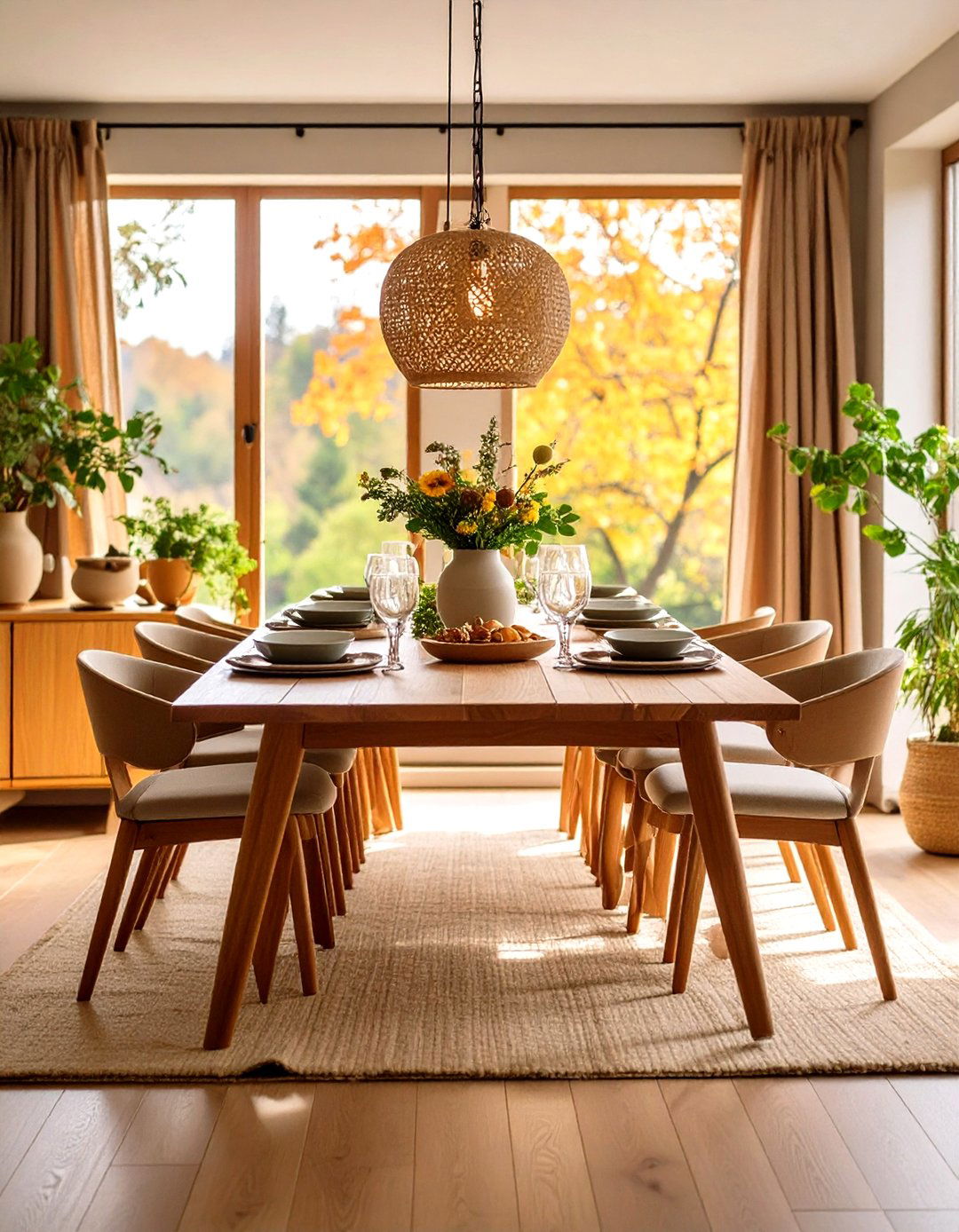
Ground your mid-century modern dining room in nature-inspired hues that reflect the movement's connection to organic materials and landscapes. Start with warm beiges, soft grays, and crisp whites as your foundational colors, then layer in rich browns and muted greens. These earthy tones create a versatile backdrop that allows furniture and lighting to shine. Natural materials like wood, leather, and stone complement this palette beautifully. The sophisticated neutrals provide calming energy perfect for dining experiences. Consider how these colors change throughout the day as natural light shifts across your space. Add texture through woven fabrics, grain patterns, and mixed finishes. This timeless approach ensures your dining room remains current while honoring the authentic spirit of mid-century design principles.
5. Bold Accent Color Pops
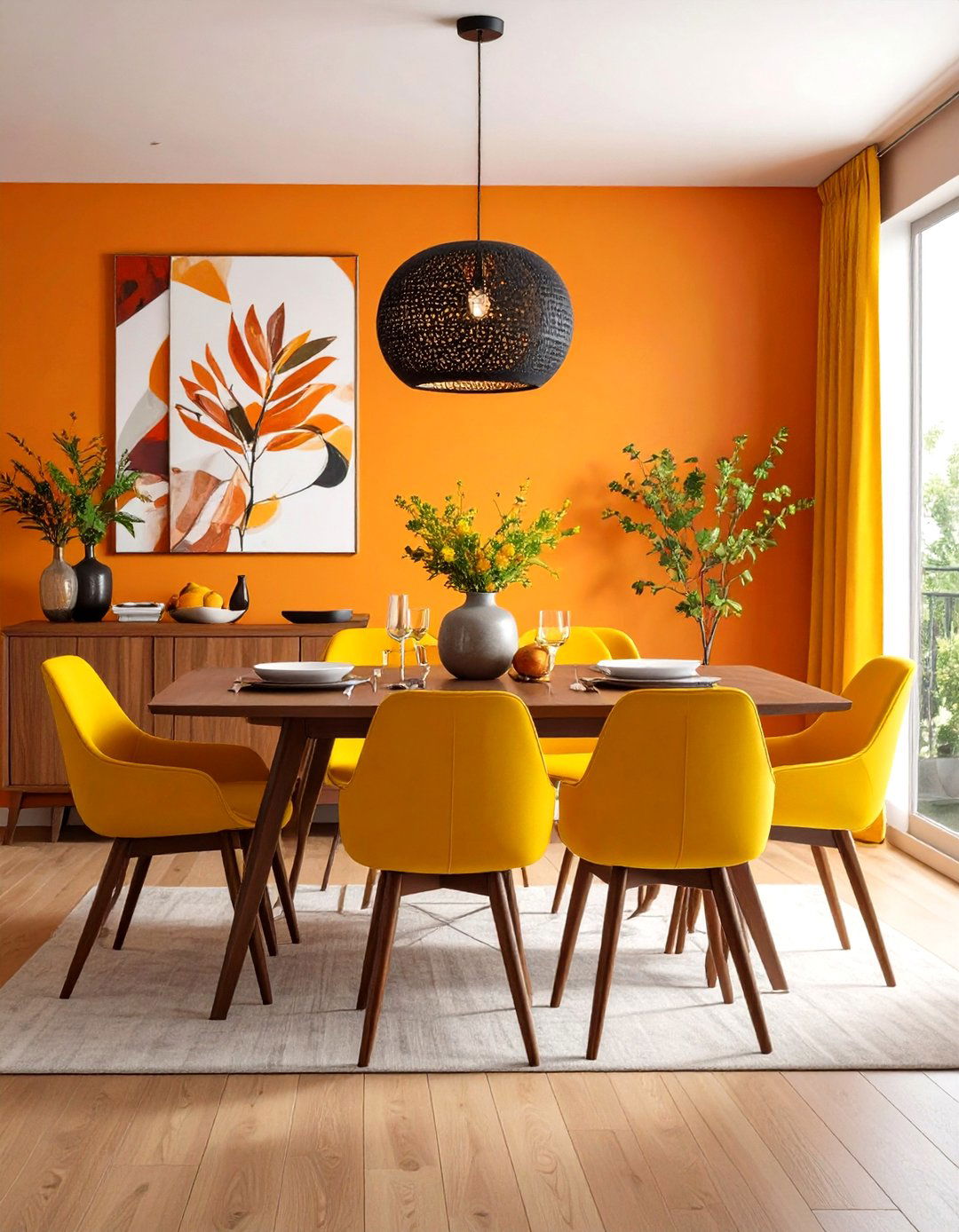
Energize your neutral mid-century dining room with strategic bursts of vibrant color that capture the era's optimistic spirit. Mustard yellow, burnt orange, and olive green were signature hues that added personality without overwhelming the space. How can color transform the mood of your dining experience? Introduce these bold accents through artwork, chair upholstery, or decorative accessories rather than major furniture pieces. A single accent wall in deep teal or forest green creates dramatic impact while maintaining sophistication. Consider the psychological effects of color—warm oranges stimulate appetite and conversation, while cool blues promote relaxation. Mix patterns and textures within your chosen accent color for visual interest. This approach allows easy updates as your preferences evolve while maintaining the authentic mid-century aesthetic.
6. Open Floor Plan Integration
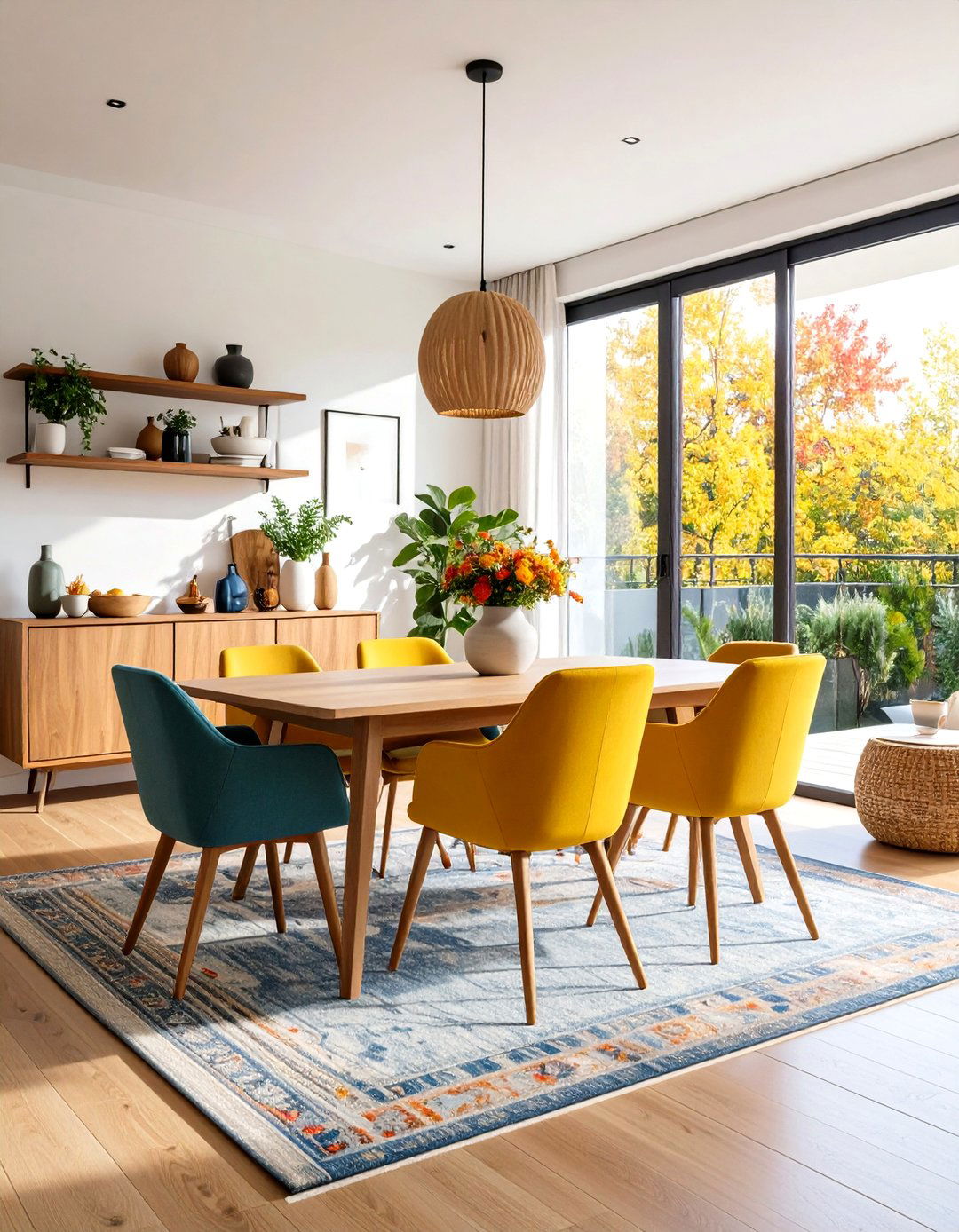
Seamlessly blend your mid-century modern dining area with adjacent living spaces through thoughtful open floor plan design that emphasizes flow and connection. Remove barriers while maintaining distinct zones through furniture placement, lighting changes, and subtle material transitions. Floating credenzas and low-profile furniture maintain sight lines while providing necessary storage and display space. Coordinate wood tones and metal finishes throughout the connected spaces for visual continuity. Area rugs help define the dining zone without creating hard boundaries. The open concept reflects mid-century principles of bringing the outdoors in and creating flexible living spaces. Consider how conversations and activities flow between areas during entertaining. This design approach makes smaller homes feel more spacious while encouraging family interaction and social connection.
7. Natural Materials Mix
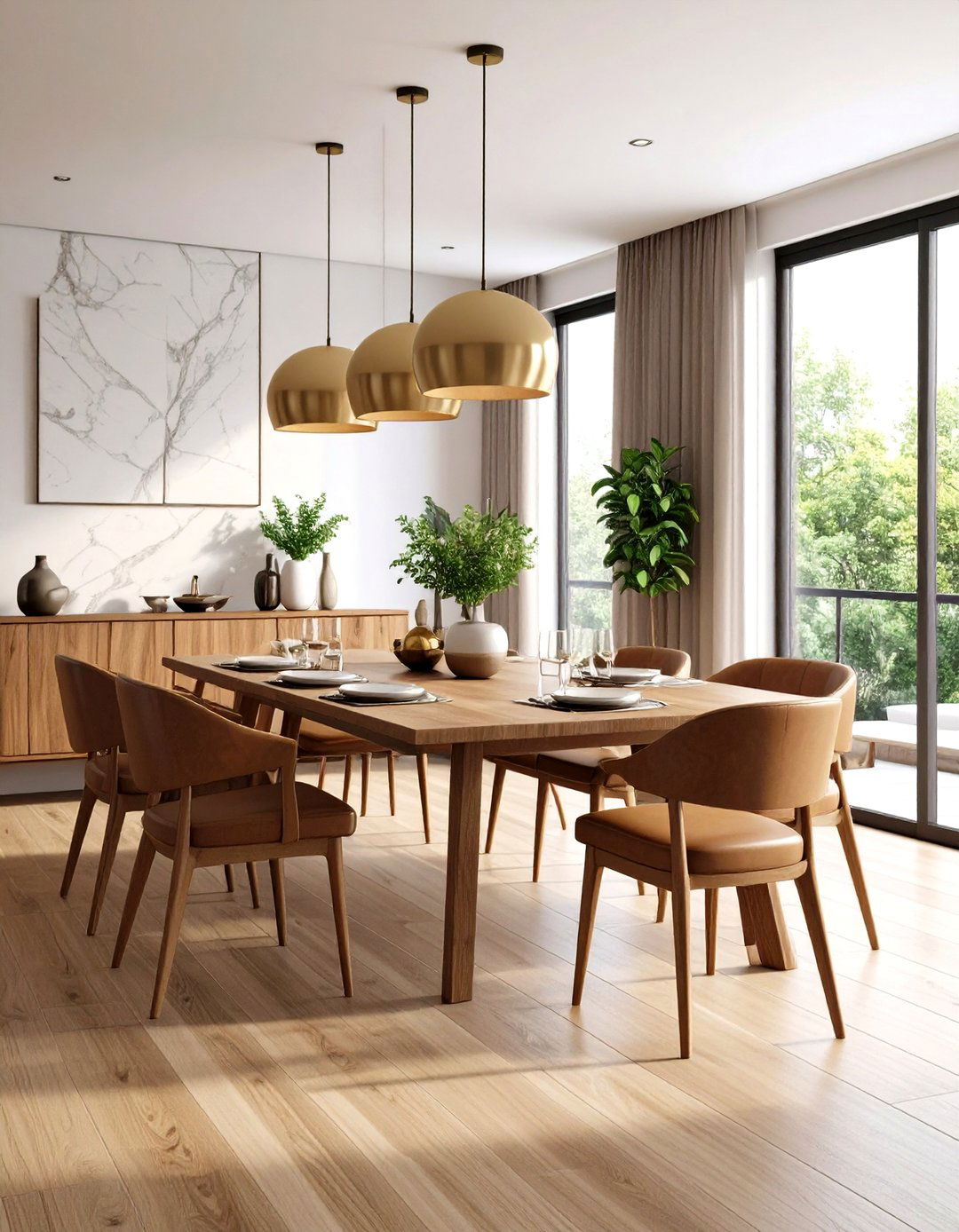
Celebrate the mid-century modern philosophy by combining diverse natural materials that showcase their inherent beauty and unique characteristics. Pair warm teak wood with cool marble surfaces, rich leather with sleek metal frames, and soft textiles with hard stone elements. Each material contributes distinct texture and visual weight to create balanced compositions. The contrast between smooth and rough, warm and cool, soft and hard adds sophisticated depth to your dining space. Choose finishes that highlight natural grain patterns, patina development, and authentic aging. Why do these material combinations feel so appealing to our senses? The variety creates tactile interest while maintaining the clean, uncluttered aesthetic central to the style. This approach connects us to nature even within interior spaces.
8. Geometric Pattern Elements
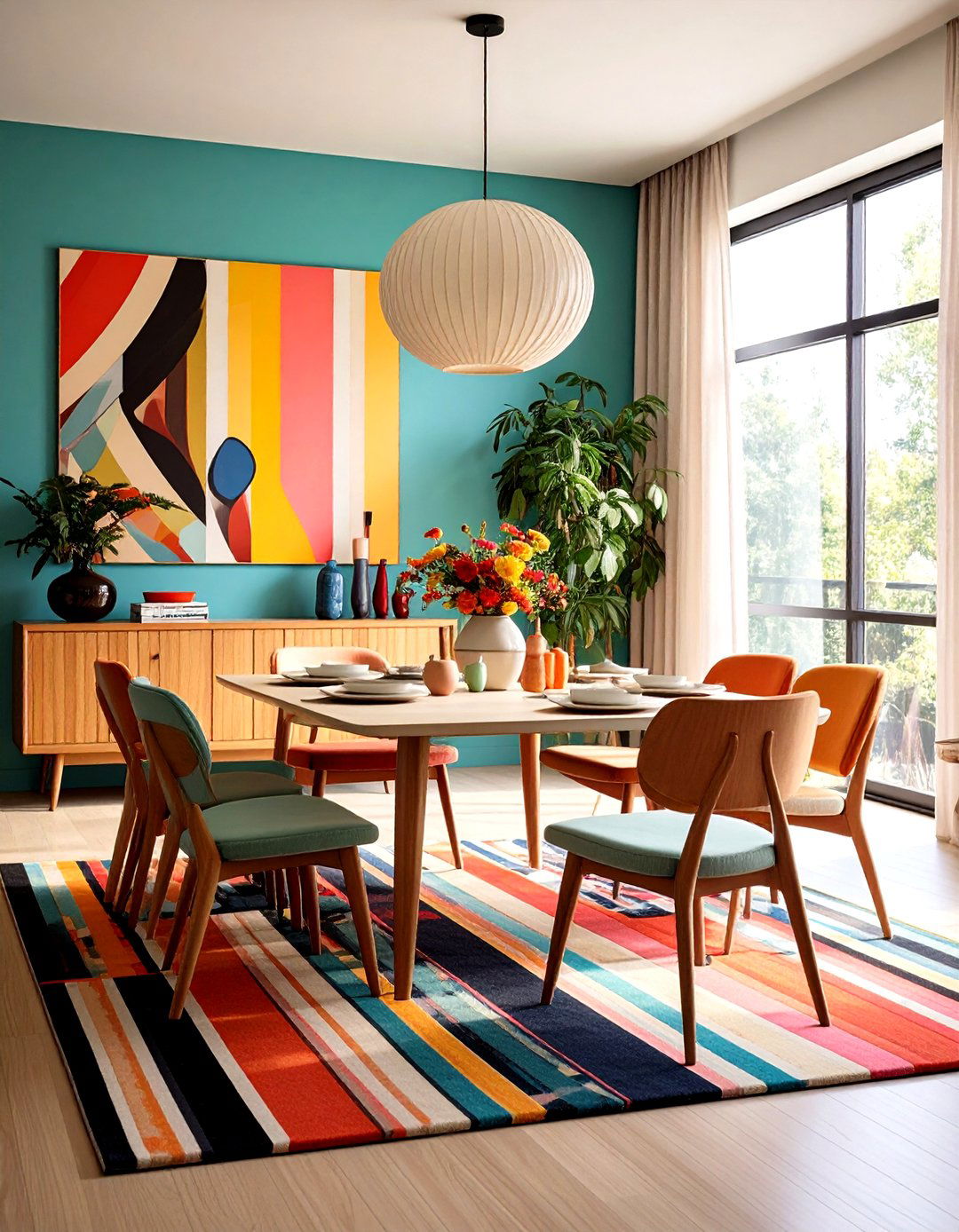
Incorporate striking geometric patterns through rugs, wallpaper, and artwork to add visual energy while honoring mid-century modern design principles. Abstract shapes, bold stripes, and atomic-inspired motifs create focal points without overwhelming the clean lines of your furniture. Start with one major patterned element and layer smaller geometric accents for balance. Black and white patterns offer timeless sophistication, while colorful versions add playful energy. Consider scale carefully—large patterns work well in spacious rooms while smaller repeats suit intimate settings. How do geometric patterns affect the perceived size and energy of your space? Mix different pattern scales for visual interest while maintaining color coordination. The key lies in restraint—too many competing patterns can destroy the serene sophistication that defines authentic mid-century modern style.
9. Scandinavian Design Influences

Blend clean Nordic aesthetics with American mid-century modern elements to create dining spaces that emphasize craftsmanship, natural materials, and functional beauty. Light woods like birch and ash complement deeper walnut tones, while simple forms prioritize comfort and usability. Scandinavian influences bring hygge warmth through soft textiles, candlelight, and cozy seating arrangements. Choose furniture with gentle curves and hand-crafted details that celebrate woodworking traditions. The color palette emphasizes whites, pale grays, and natural wood tones with minimal accent colors. This approach creates calming environments perfect for long, leisurely meals with family and friends. Consider how different lighting conditions affect the mood throughout seasons. The Scandinavian connection to nature enhances the mid-century modern appreciation for bringing outdoor elements inside through materials, plants, and natural light.
10. Eames-Style Furniture Collections
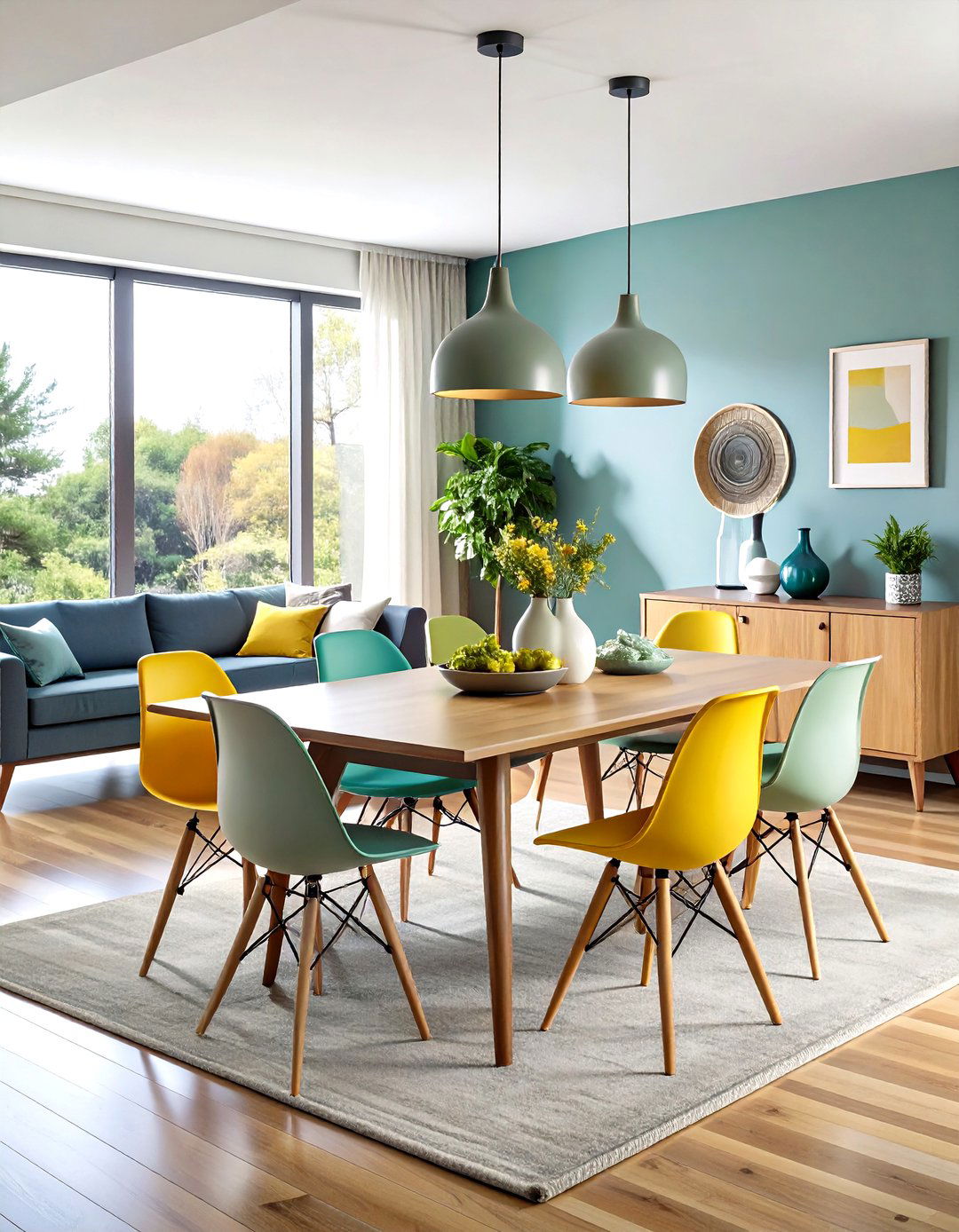
Showcase the innovative spirit of Charles and Ray Eames through carefully curated furniture collections that demonstrate their revolutionary approach to design and manufacturing. Molded plywood chairs with metal legs epitomize the era's experimentation with new materials and production techniques. Mix different Eames-inspired pieces—dining chairs, lounge seating, and storage units—while maintaining visual coherence through shared design DNA. The combination of organic curves with industrial materials creates sophisticated tension that defines mid-century modern appeal. Choose authentic vintage pieces or high-quality reproductions that honor the original designs. Why do these furniture forms continue to feel contemporary decades after their creation? Layer different textures and finishes within the collection for visual interest. This approach creates museum-quality spaces that celebrate design innovation while providing comfortable, functional dining environments.
11. Globe Pendant Lighting Clusters
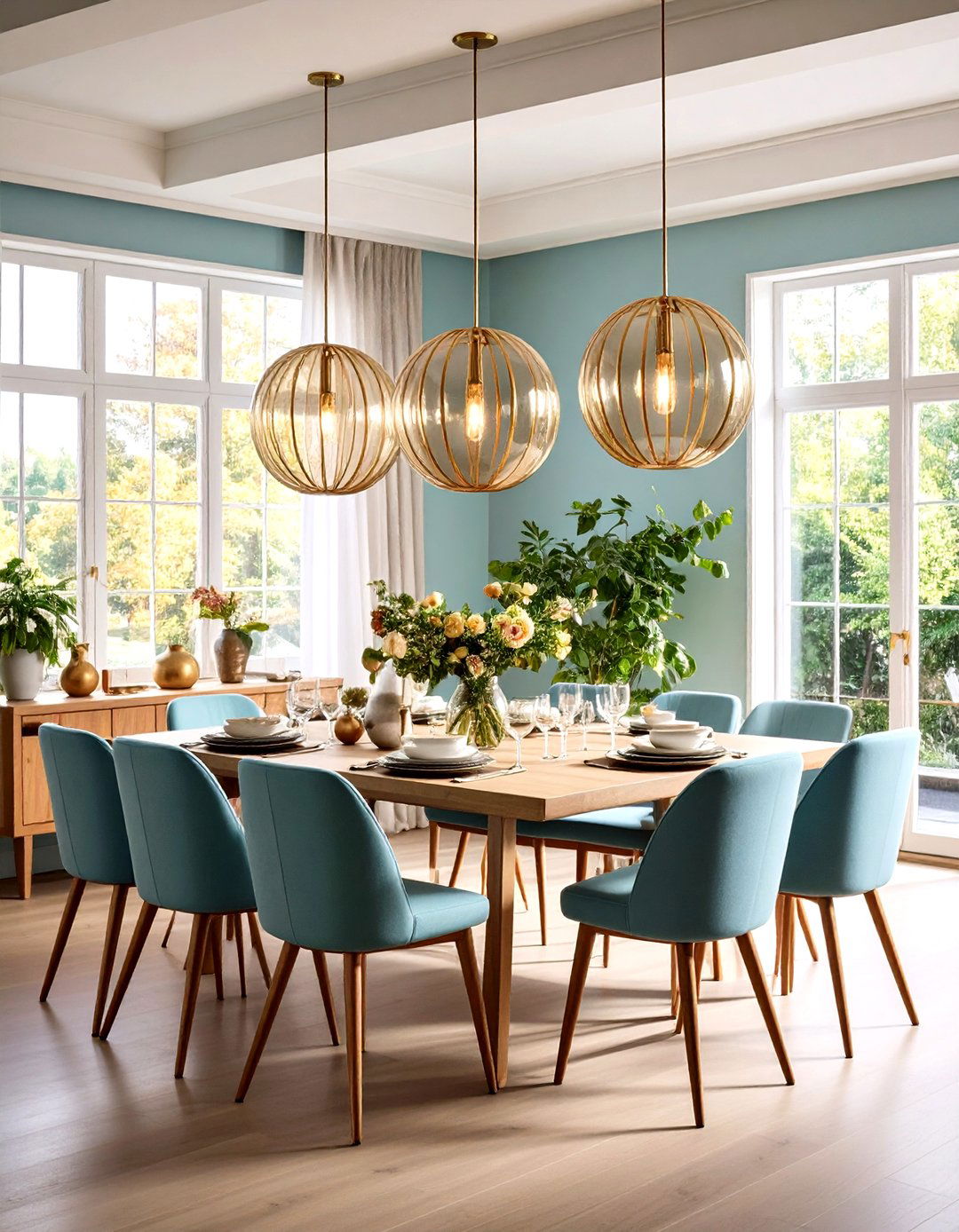
Create ambient lighting magic with grouped globe pendant fixtures that provide both functional illumination and sculptural beauty above your dining table. These spherical lights embody the atomic age fascination with celestial forms while offering warm, diffused light perfect for dining experiences. Arrange three pendants at varying heights for dynamic visual interest, or opt for linear arrangements in rectangular spaces. Glass globes with brass or chrome fittings complement mid-century modern furniture perfectly. Consider dimmer controls to adjust lighting levels from bright task lighting to intimate dinner ambiance. The clean, simple forms won't compete with other design elements while providing necessary overhead lighting. How does lighting affect the mood and energy of your dining experience? This timeless approach works beautifully in both traditional mid-century homes and contemporary spaces seeking vintage charm.
12. Abstract Wall Art Galleries
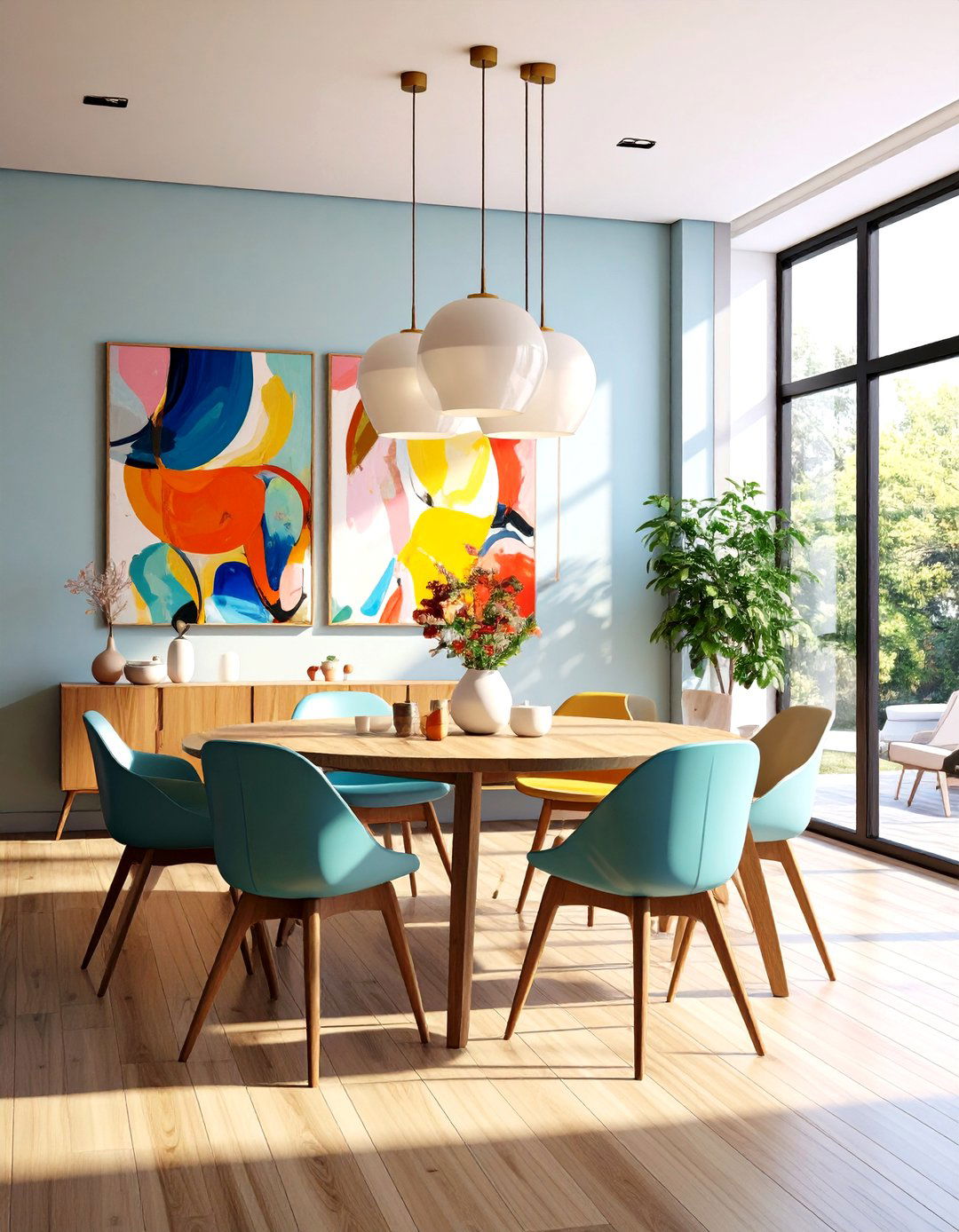
Transform your dining room walls into curated galleries featuring abstract expressionist artwork that reflects the creative energy of the mid-century modern era. Bold color fields, geometric compositions, and organic shapes add visual interest while complementing clean furniture lines. Start with one large statement piece or create grouped arrangements of smaller works for impact. Consider the relationship between art colors and your overall room palette for harmony. Original vintage pieces from the era bring authenticity, while contemporary works inspired by the movement offer fresh interpretations. Frame choices matter—select simple, clean profiles that don't compete with the artwork. What emotional response do you want your art to create during dining experiences? Proper lighting ensures artwork remains visible and impactful throughout different times of day. This approach personalizes your space while honoring artistic traditions of the period.
13. Credenza Storage Solutions
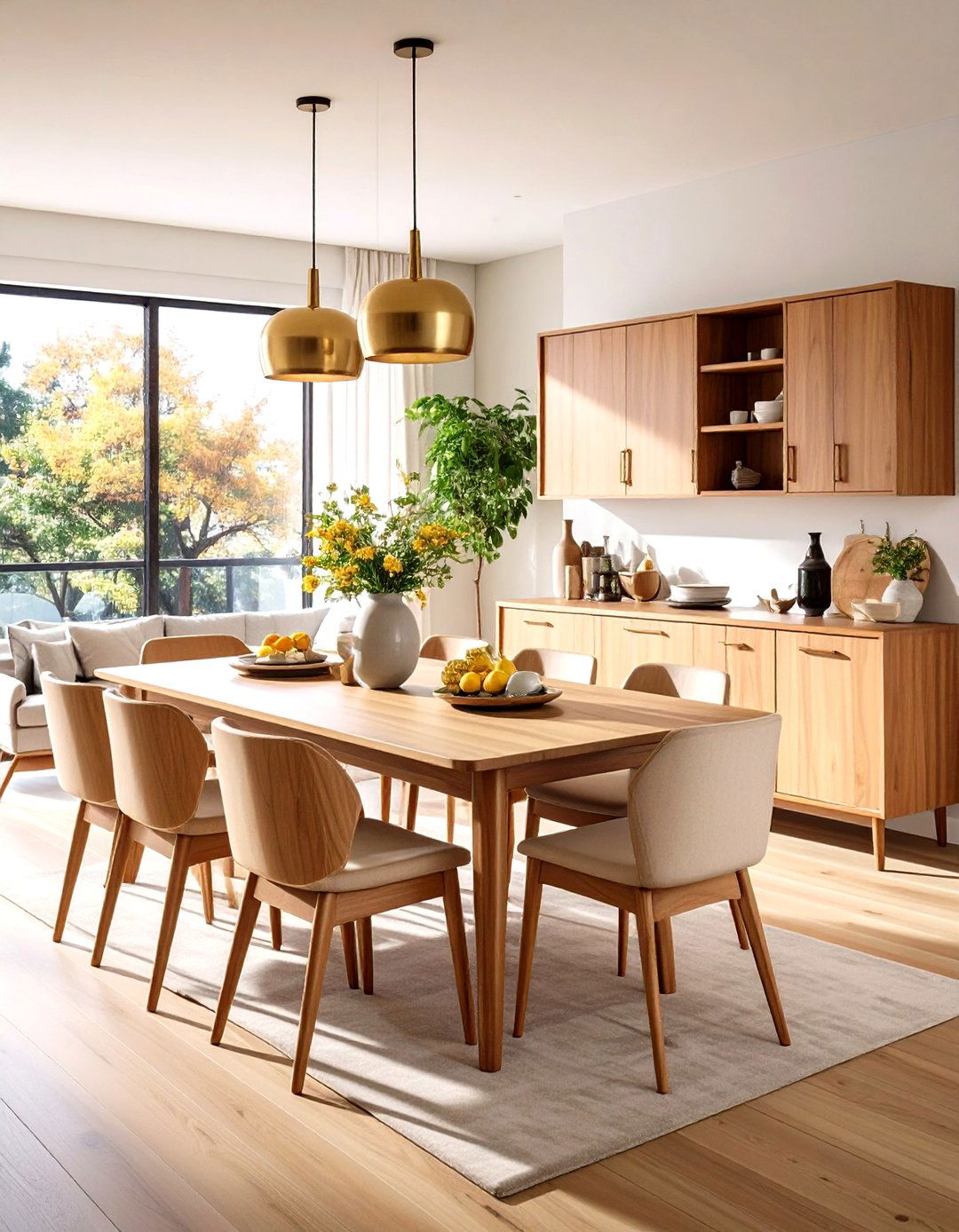
Maximize your dining room functionality with sleek credenza storage that exemplifies mid-century modern design principles while providing practical organization for entertaining essentials. Low-profile pieces with sliding doors or hinged panels maintain clean sight lines while concealing dishes, linens, and serving pieces. Choose walnut, teak, or rosewood finishes that complement your dining table selection. Brass hardware adds warm metallic accents that tie into lighting fixtures. The top surface provides display space for decorative objects, plants, or serving pieces during meals. Built-in lighting within some credenzas highlights displayed items beautifully. Consider the balance between open display and concealed storage based on your entertaining style. How can storage furniture contribute to your room's overall aesthetic while serving practical needs? This dual-purpose approach reflects the era's emphasis on functional beauty and efficient living.
14. Wishbone Chair Arrangements
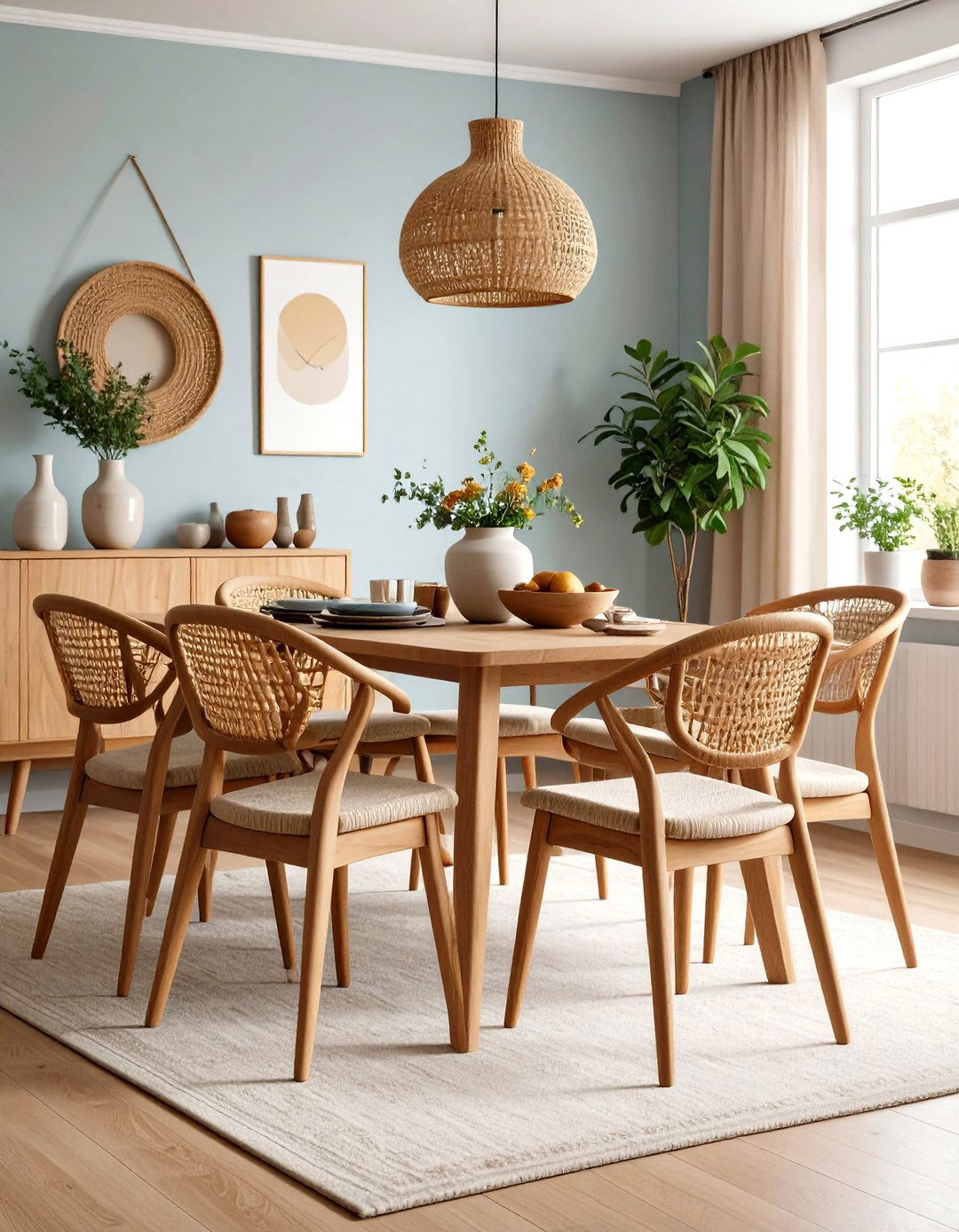
Embrace Danish design heritage with iconic wishbone chairs that combine sculptural beauty with exceptional comfort around your mid-century modern dining table. The distinctive Y-shaped back and woven cord seat create visual lightness while providing ergonomic support for extended dining sessions. Natural wood finishes in oak, walnut, or ash complement various table materials beautifully. The curved lines soften angular table edges for pleasing contrast. Mix solid wood with upholstered versions for variety while maintaining design coherence. These chairs work equally well in formal and casual dining settings. The handcrafted quality adds authentic artisan appeal to mass-produced environments. What makes certain furniture designs feel timeless across decades? Consider how the chairs look from all angles in open floor plans. The investment in quality craftsmanship pays dividends through lasting beauty and comfort.
15. Banquette Seating Integration

Maximize seating capacity while creating cozy intimacy through built-in banquette seating that reflects mid-century modern efficiency and style. Custom upholstered benches along walls provide more seating than individual chairs while opening up floor space for better traffic flow. Choose fabrics in solid colors or simple patterns that complement your overall design scheme. Add throw pillows for comfort and color variety. The linear form emphasizes horizontal lines characteristic of the architectural style. Combine banquettes with moveable chairs for flexible seating arrangements. Storage compartments beneath seats provide additional functionality for seasonal items or extra linens. How does built-in seating change the dynamics of dinner conversations? Position banquettes to take advantage of windows for natural light and views. This efficient use of space embodies the era's problem-solving approach to modern living challenges.
16. Mid-Century Bar Areas
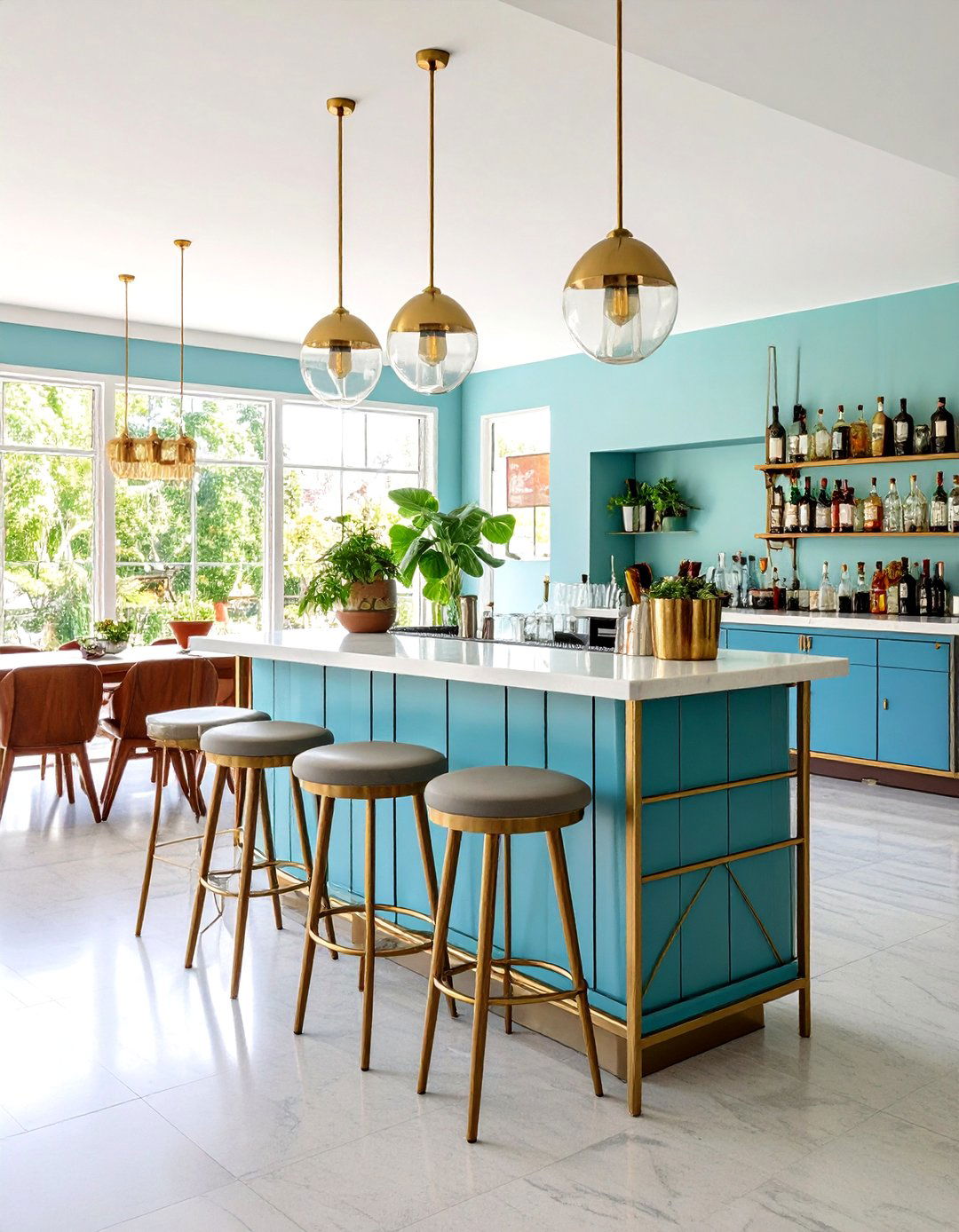
Extend your entertaining capabilities with dedicated bar areas that capture the sophisticated cocktail culture of the mid-century modern era. Sleek bar carts with geometric forms and mixed materials provide mobile serving stations that can be repositioned as needed. Stock with period-appropriate glassware, decanters, and accessories for authentic appeal. Choose pieces featuring brass, chrome, or wood construction that coordinate with dining furniture. The bar becomes a functional sculpture when not in service. Consider built-in bars with wood paneling and stone countertops for permanent installations. Proper lighting—perhaps with pendant fixtures or under-cabinet illumination—creates ambiance for cocktail preparation. What role did cocktail culture play in mid-century social life? Include vintage barware and classic cocktail recipe books as decorative elements. This approach adds sophistication while honoring the era's appreciation for well-crafted drinks and gracious entertaining.
17. Mixed Vintage Chair Collections

Create eclectic sophistication by combining different vintage chair designs that share mid-century modern DNA while adding visual variety to your dining space. Mix Eames molded plywood with Scandinavian wood frames, or combine leather upholstery with woven cane seats for textural interest. The key lies in maintaining common elements—similar wood tones, proportional relationships, or shared materials—that unify diverse pieces. This approach reflects the era's experimental spirit and rejection of matching furniture sets. Vintage authenticity adds character and patina that new pieces cannot replicate. How does mixing different chair styles affect the energy and personality of your dining room? Consider comfort and functionality alongside aesthetic appeal when making selections. The collected-over-time appearance suggests personal curation rather than decorator perfection, creating spaces that feel lived-in and loved.
18. Marble and Wood Combinations
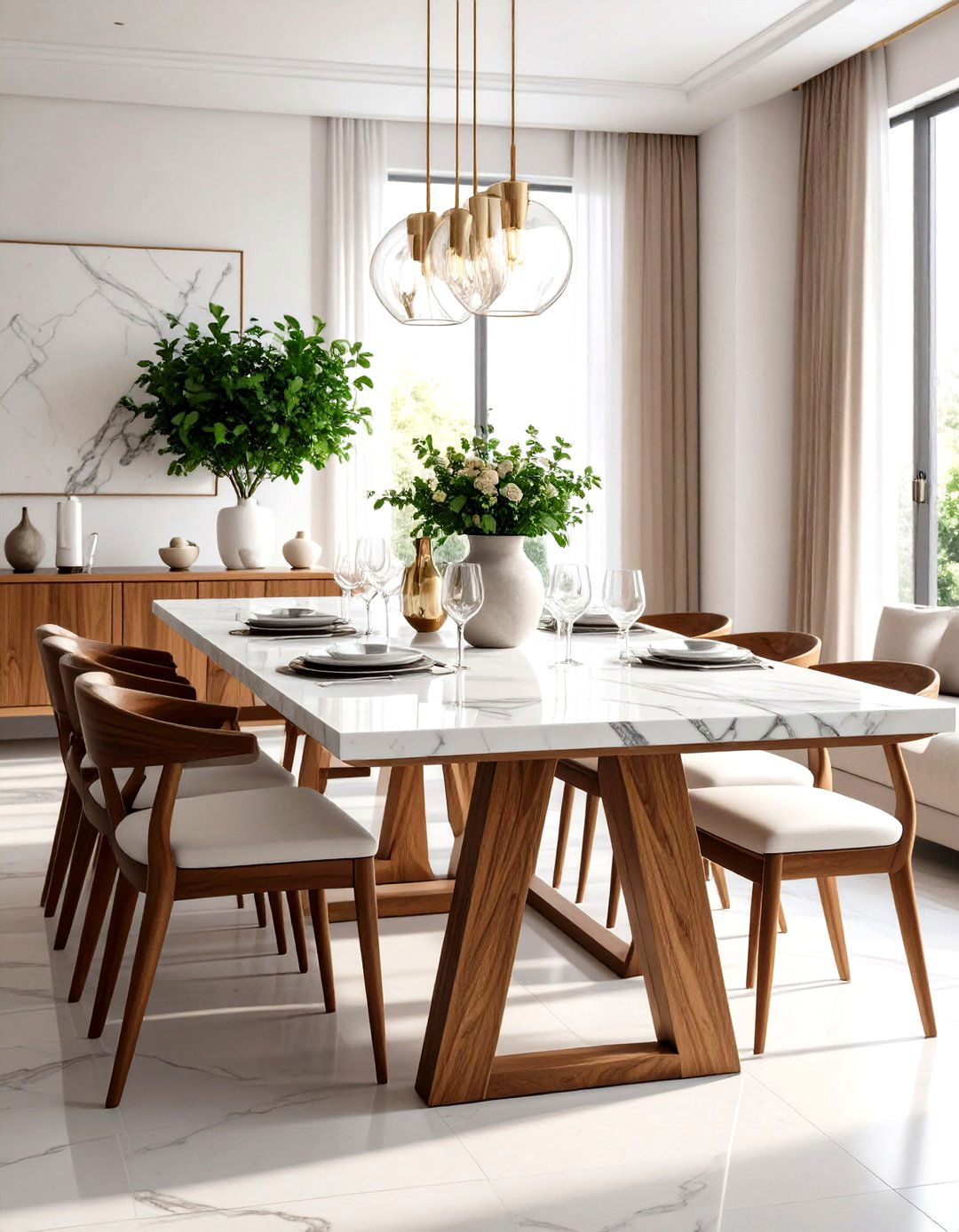
Achieve sophisticated material balance by pairing cool marble surfaces with warm wood elements that exemplify mid-century modern appreciation for natural contrasts. White Carrara or black marble table tops provide elegant surfaces that highlight the beauty of natural stone patterns. Combine with walnut or teak bases for warm balance. The smooth, cool marble contrasts beautifully with wood grain textures and patterns. This combination works well for both dining tables and credenza tops. Consider how different lighting conditions affect marble's appearance throughout the day. The materials age gracefully, developing character through use while maintaining their inherent beauty. What makes natural materials so appealing in interior design? Proper care and maintenance preserve both materials for decades of enjoyment. This classic pairing transcends trends while providing practical, beautiful surfaces for dining and entertaining.
19. Gallery Wall Compositions
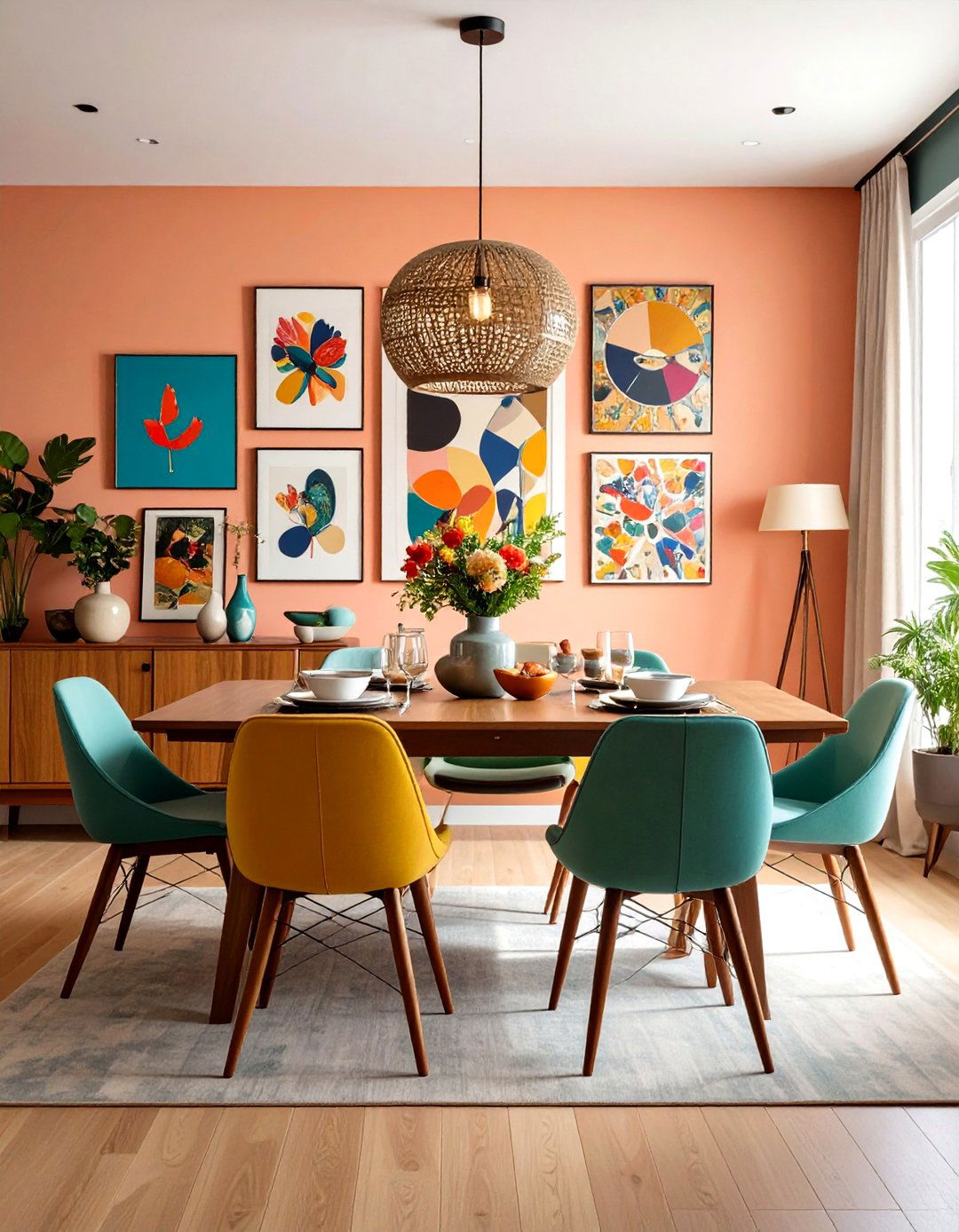
Design dynamic wall installations featuring mid-century modern artwork, photography, and objects that reflect the era's artistic innovations and cultural influences. Combine abstract paintings with architectural photography, vintage posters, and three-dimensional pieces for varied visual interest. Maintain consistent framing or mat colors for cohesion while allowing diverse content to shine. Consider the relationship between wall composition and furniture placement for balanced room proportions. The gallery approach personalizes spaces while demonstrating appreciation for design history and artistic expression. How do wall displays affect the perception of room scale and personality? Include lighting to highlight artwork properly and create ambiance during dining. Mix original pieces with high-quality reproductions to achieve the desired aesthetic within budget constraints. This curatorial approach transforms dining rooms into personal museums celebrating mid-century modern culture and creativity.
20. Natural Light Maximization
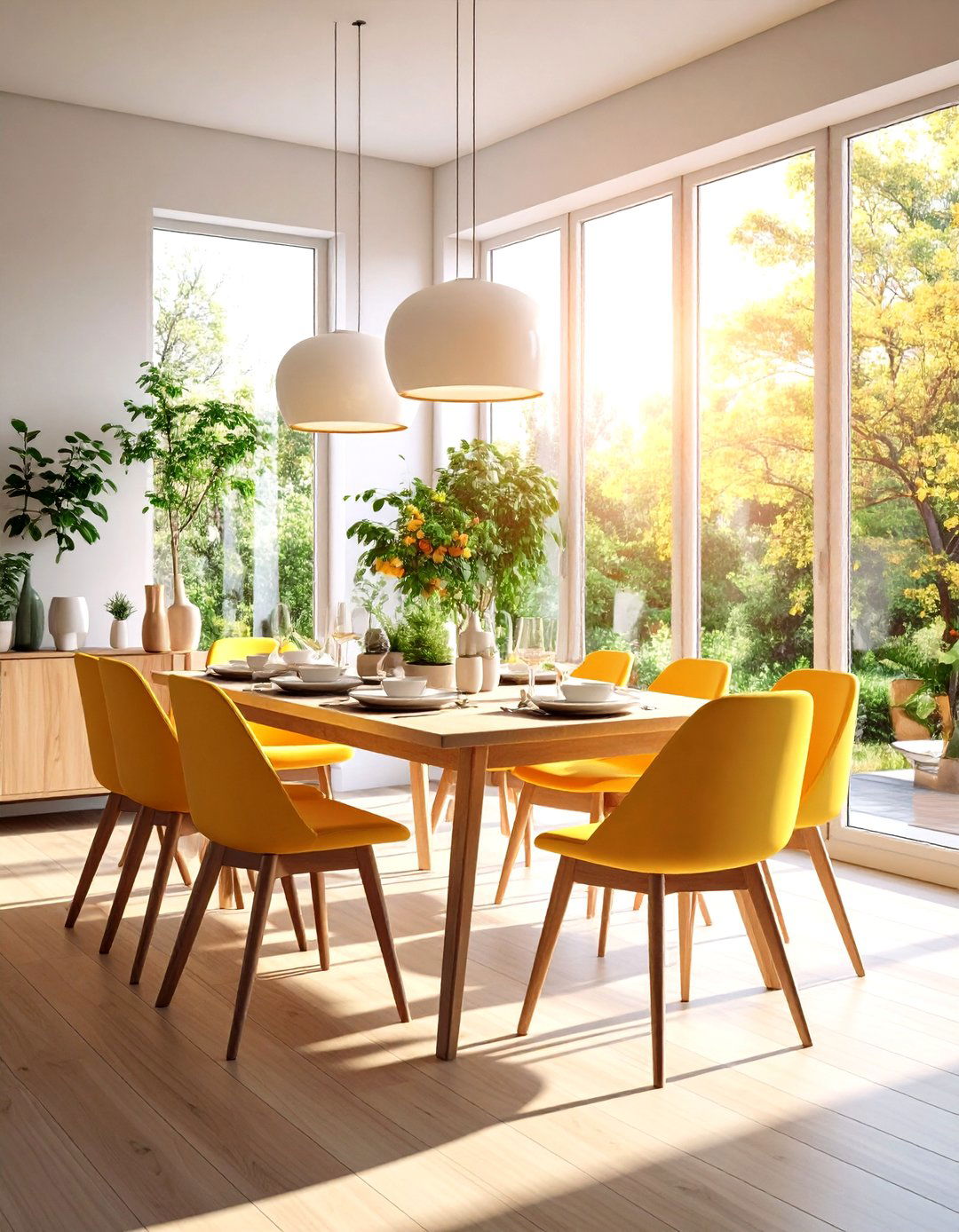
Harness the power of natural light to enhance your mid-century modern dining room's connection to the outdoors and highlight architectural features. Large windows without heavy treatments allow maximum light penetration while maintaining privacy through strategic placement or landscape design. The abundance of natural light emphasizes clean lines, natural materials, and color relationships throughout different times of day. Consider how seasonal light changes affect your space's mood and functionality. Light-colored surfaces reflect and amplify available illumination, making spaces feel larger and more open. Position dining tables to take advantage of the best light for daily meals while avoiding glare during evening entertaining. Does natural light influence your appetite and dining experience? Complement windows with skylights where possible to bring additional overhead illumination. This connection to natural rhythms enhances the era's philosophy of bringing outdoor elements into interior spaces.
21. Rustic Modern Blend

Merge mid-century modern sophistication with rustic charm through carefully balanced material choices that add warmth without sacrificing clean design principles. Combine smooth manufactured surfaces with rough-hewn wood elements, sleek metal with natural stone, and precise geometric forms with organic shapes. This approach softens the sometimes stark minimalism of pure mid-century style while maintaining its essential character. Consider how different textures catch and reflect light for visual interest. The rustic elements ground the space in natural authenticity while modern pieces provide functional efficiency. What emotional response do you have to different material textures in your living environment? This blend works particularly well in rural or suburban settings where outdoor connections feel natural. Balance requires restraint—too much rusticity overwhelms the modern elements, while too much refinement loses the desired warmth and character.
22. Small Space Solutions
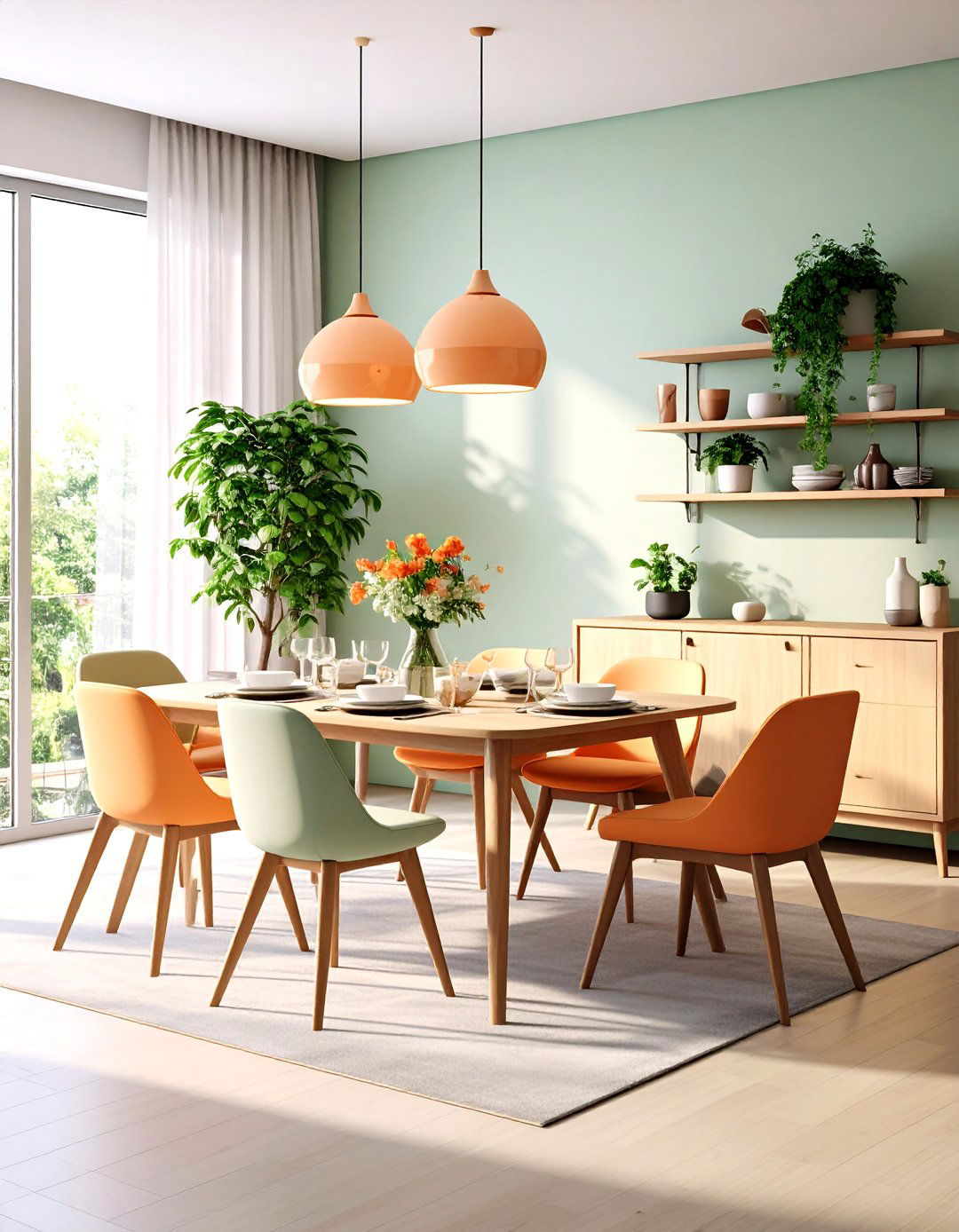
Maximize limited square footage through space-efficient mid-century modern design strategies that prioritize function without compromising style or comfort. Choose furniture with dual purposes—storage ottomans, expandable tables, and nesting pieces that serve multiple functions. Light colors and reflective surfaces make small spaces feel larger and brighter. Vertical storage solutions draw the eye upward, creating the illusion of height. Select furniture with exposed legs to maintain visual flow across floor surfaces. How can clever design make small spaces feel more generous and welcoming? Built-in seating maximizes capacity while minimizing footprint. Consider wall-mounted lighting and floating shelves to free up floor and table space. The mid-century emphasis on efficiency and function makes it ideal for small-space living. This approach proves that great design isn't dependent on square footage but on thoughtful planning and execution.
23. Formal Entertaining Spaces
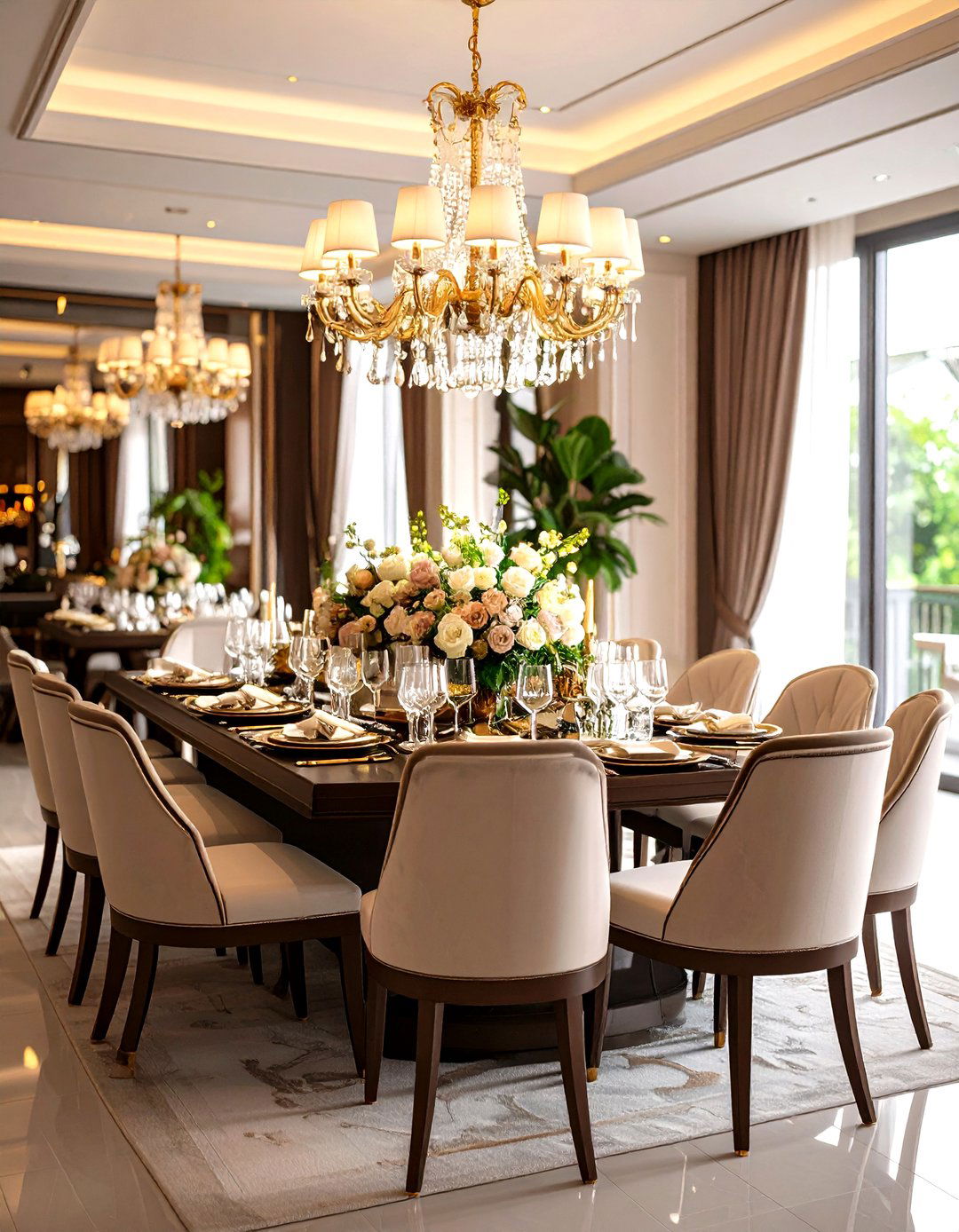
Create sophisticated dining environments designed specifically for hosting elegant dinner parties and special occasions with mid-century modern flair. Choose larger dining tables that accommodate extended guest lists while maintaining the clean lines and quality materials characteristic of the style. Formal doesn't mean fussy—the mid-century approach emphasizes understated elegance through superior materials and craftsmanship rather than ornate decoration. Consider how lighting can be adjusted from bright task illumination to intimate ambient glow for different occasions. Quality stemware, dinnerware, and serving pieces complement the furniture investment. How does your dining environment affect guest comfort and conversation flow? Include adequate storage for entertaining essentials while maintaining the uncluttered aesthetic. The goal is sophisticated simplicity that lets food, company, and conversation take center stage without design distractions.
24. Casual Family Dining Areas
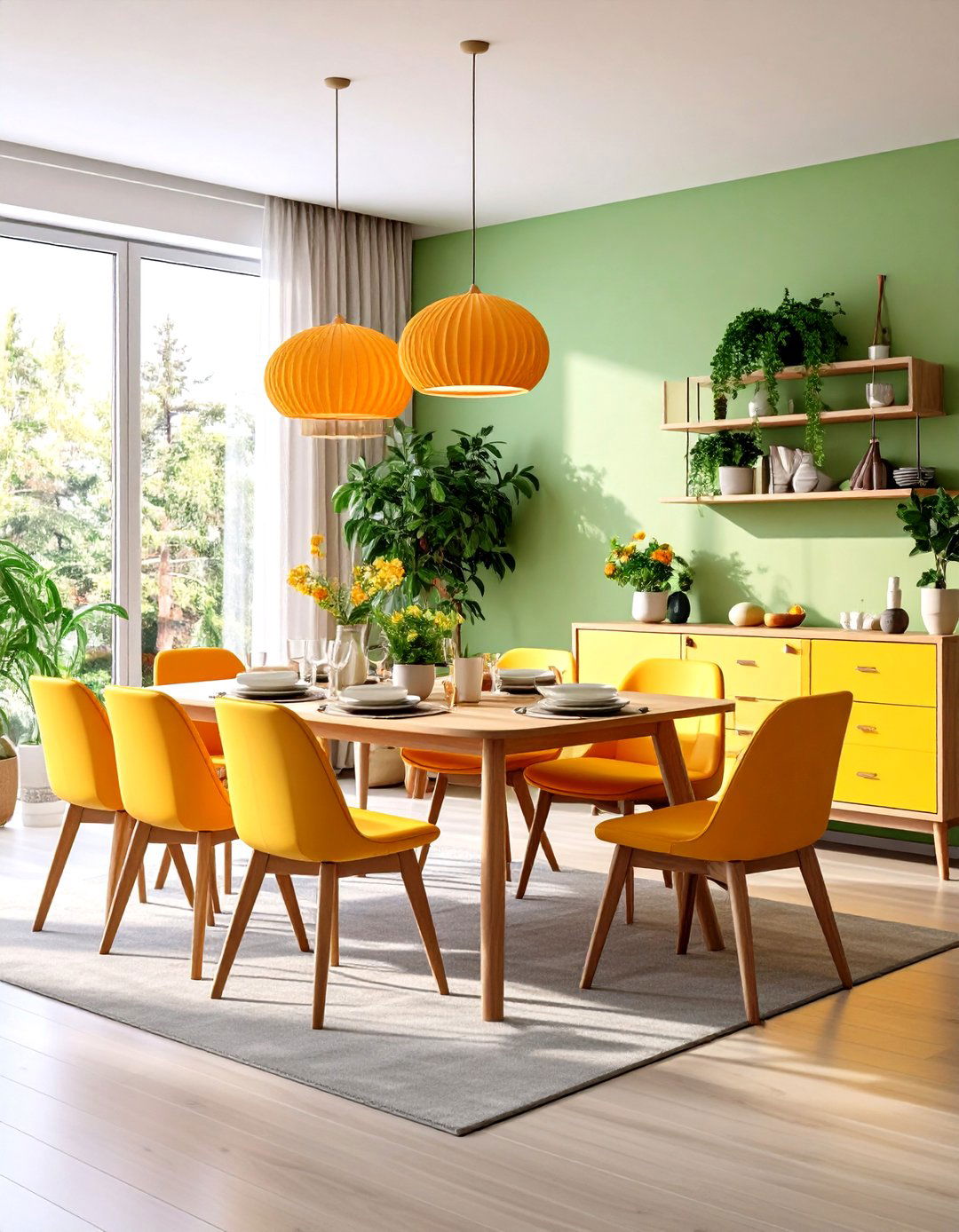
Design comfortable, family-friendly dining spaces that embody mid-century modern principles while accommodating the practical needs of daily life with children and pets. Choose durable materials and finishes that can withstand regular use while maintaining their beauty over time. Rounded table edges provide safety for active children, while stain-resistant fabrics and easy-to-clean surfaces simplify maintenance. The emphasis on function over fuss makes mid-century modern ideal for real family living. Built-in storage keeps toys, art supplies, and homework materials organized but accessible. What makes a dining space feel welcoming for both adults and children? Consider flexible seating options that accommodate changing family needs as children grow. The timeless appeal of quality mid-century design means these pieces can transition from family use to more formal applications as circumstances change.
Conclusion:
Mid-century modern dining rooms offer endless possibilities for creating spaces that beautifully balance style, function, and timeless appeal. From the warm richness of walnut furnishings to the dramatic impact of sputnik lighting, each design approach celebrates the era's revolutionary spirit while meeting contemporary living needs. These 24 distinct themes demonstrate how versatile mid-century modern principles can be, adapting to various space sizes, budgets, and lifestyle requirements. Whether you prefer the clean minimalism of Scandinavian influences, the bold energy of geometric patterns, or the sophisticated charm of mixed vintage collections, the key lies in honoring the movement's core values: quality materials, functional beauty, and thoughtful design. By embracing these authentic mid-century modern approaches, you can create dining spaces that feel both nostalgically familiar and refreshingly current, proving that great design truly transcends time and continues inspiring new generations of style enthusiasts.


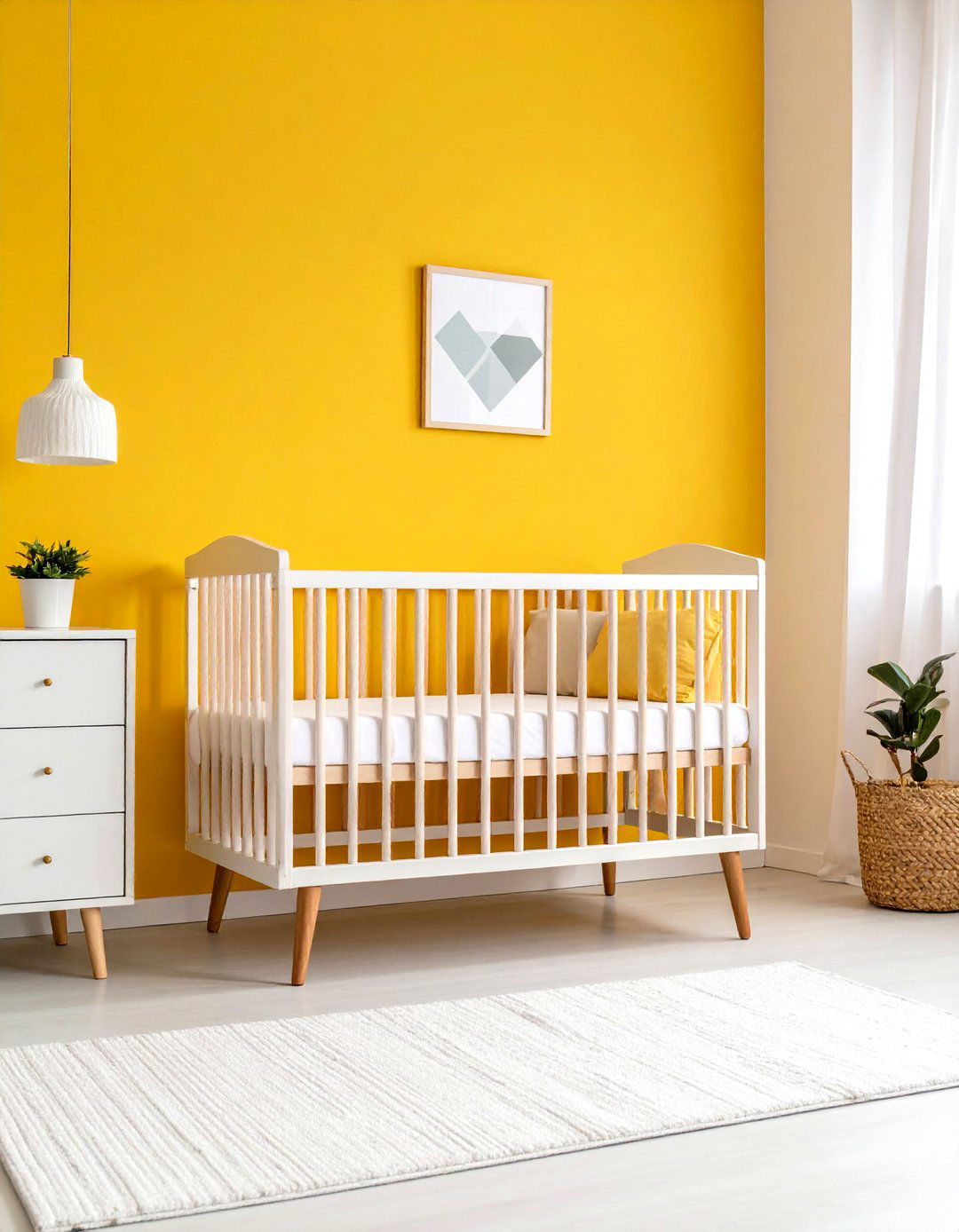
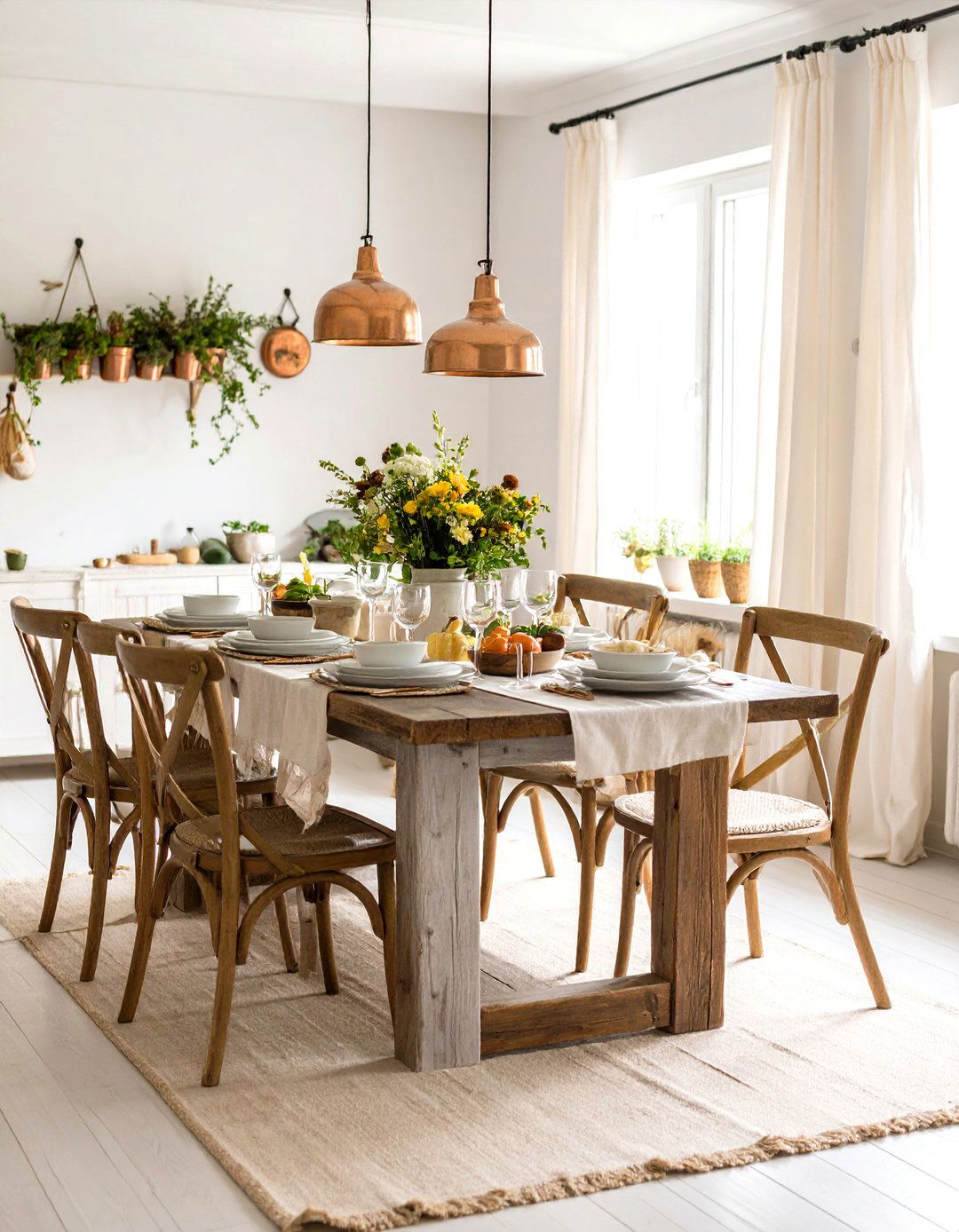
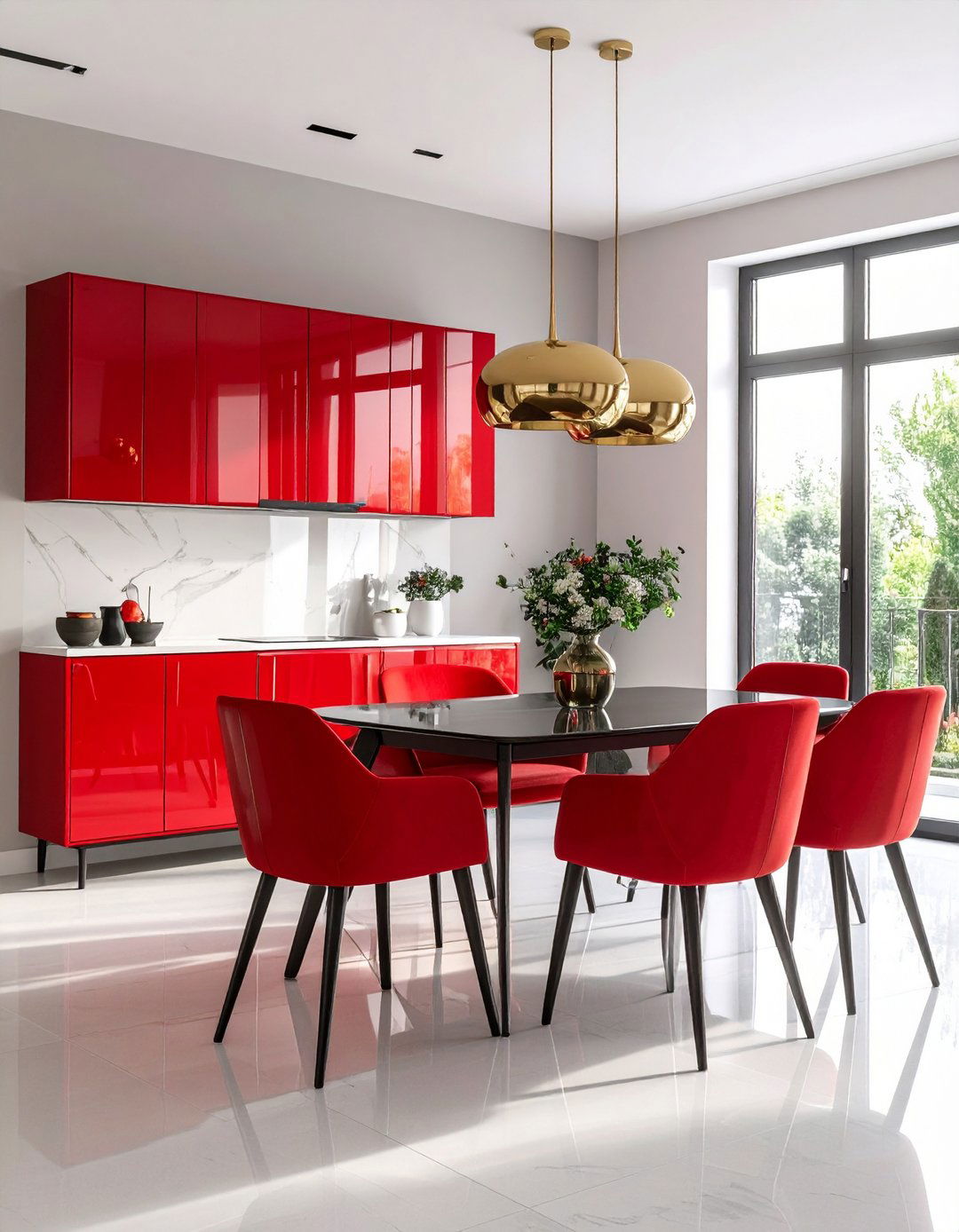


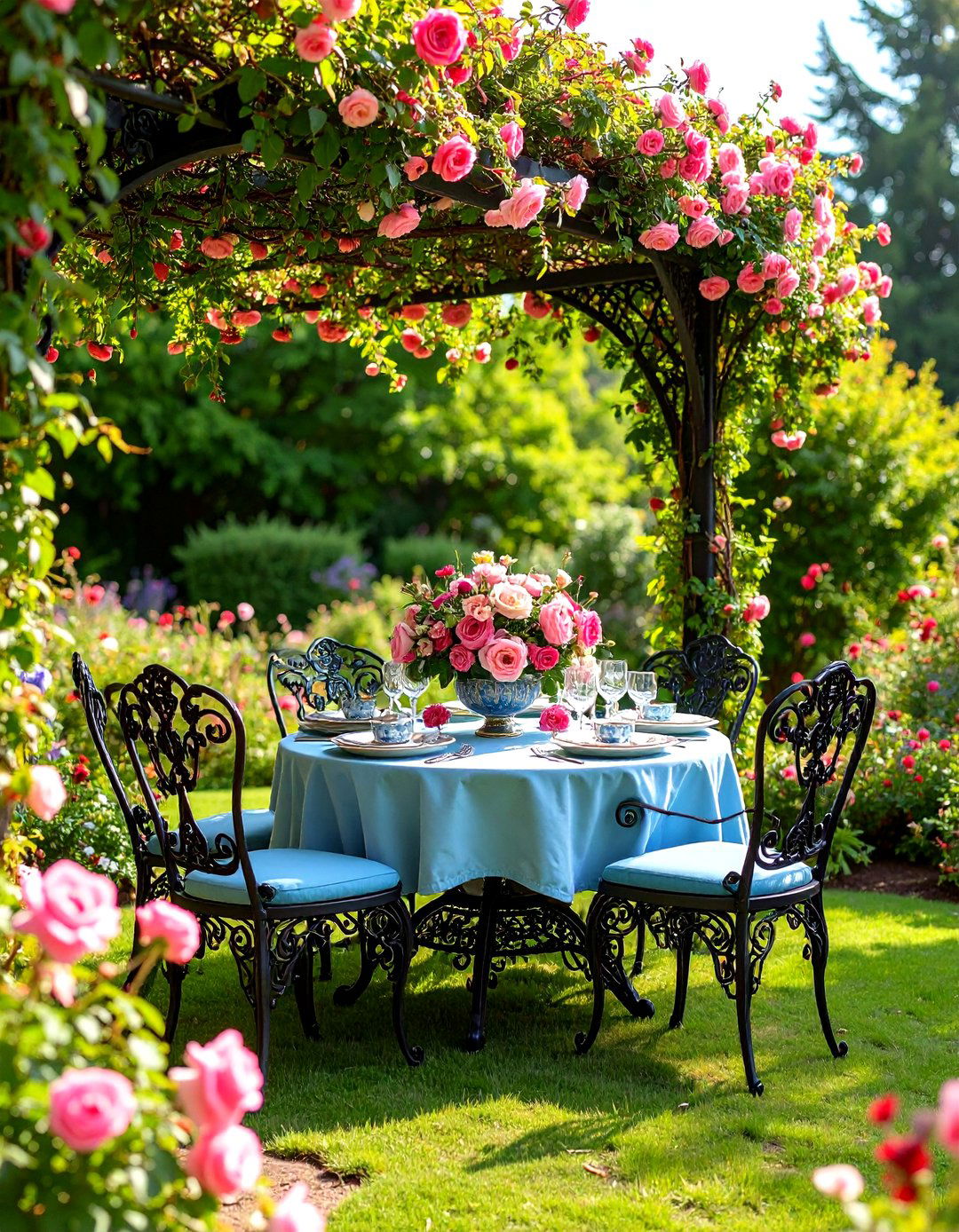

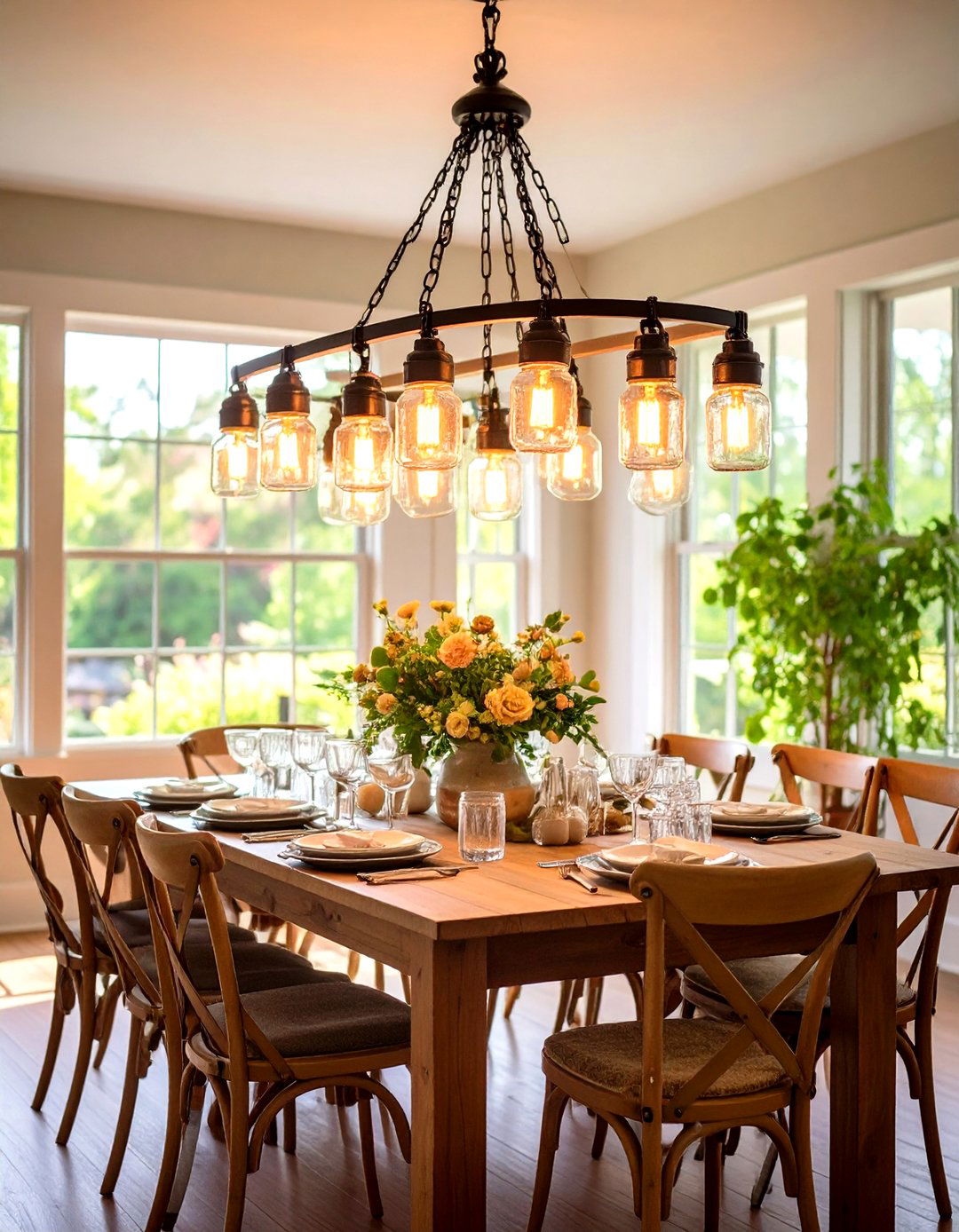
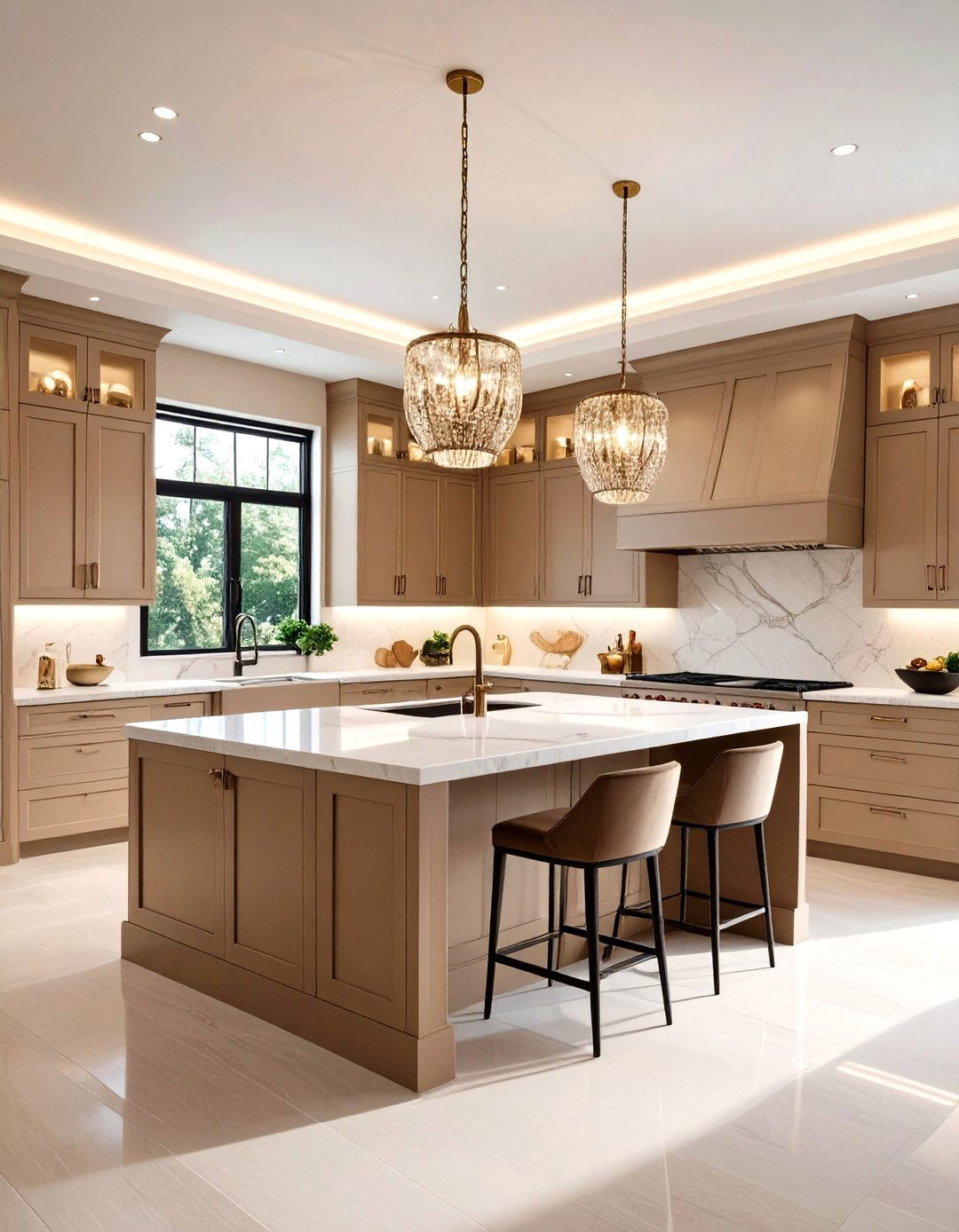
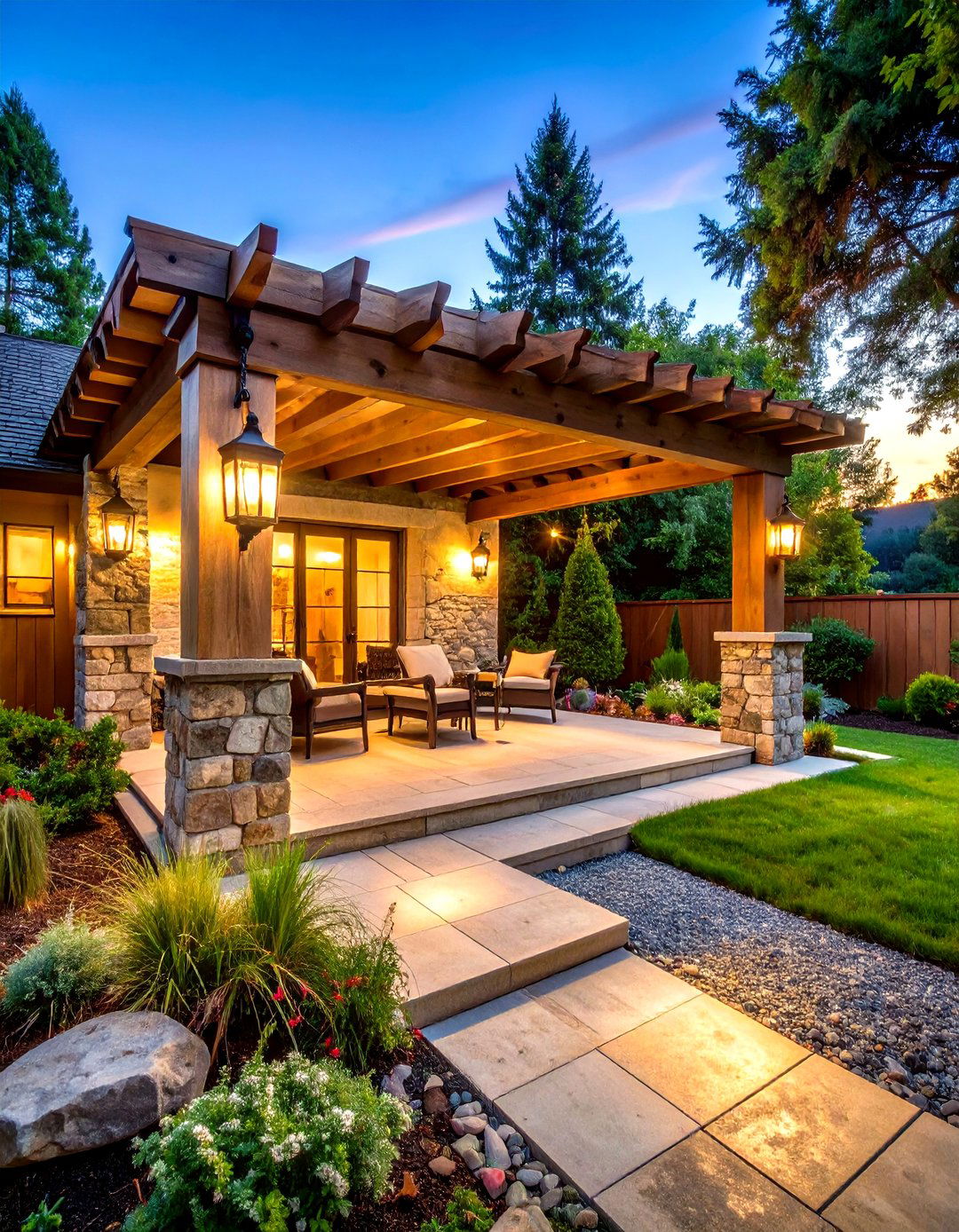
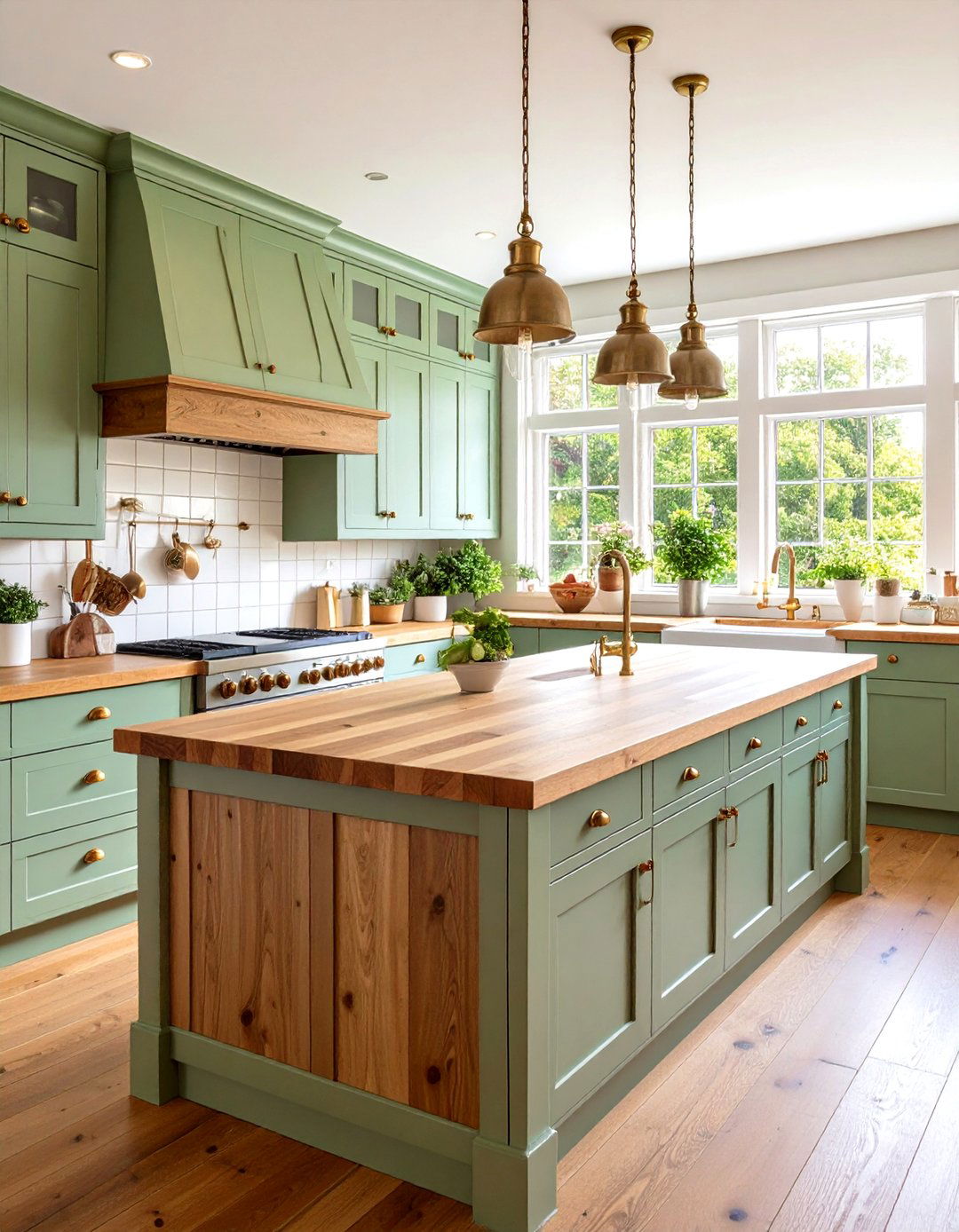

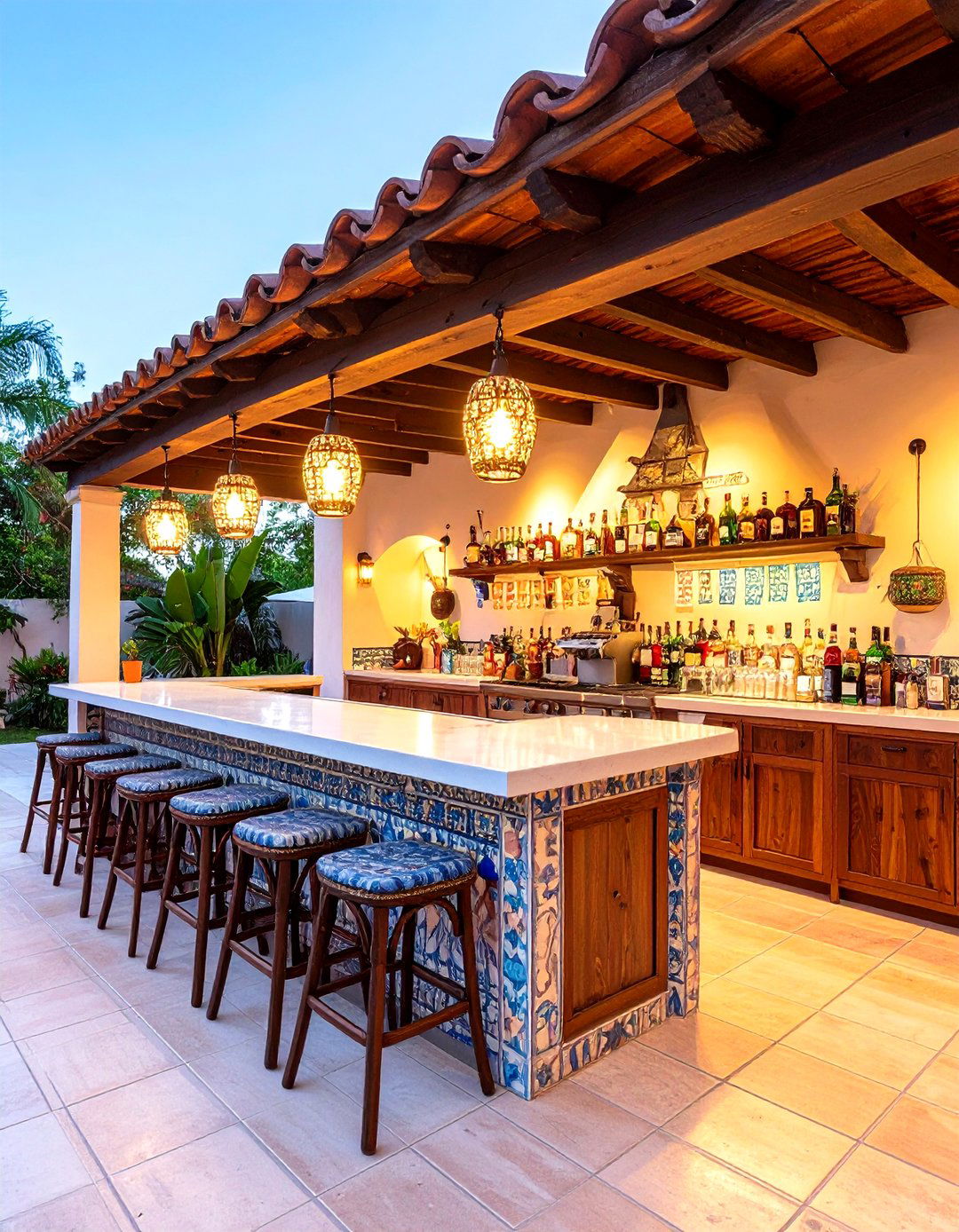

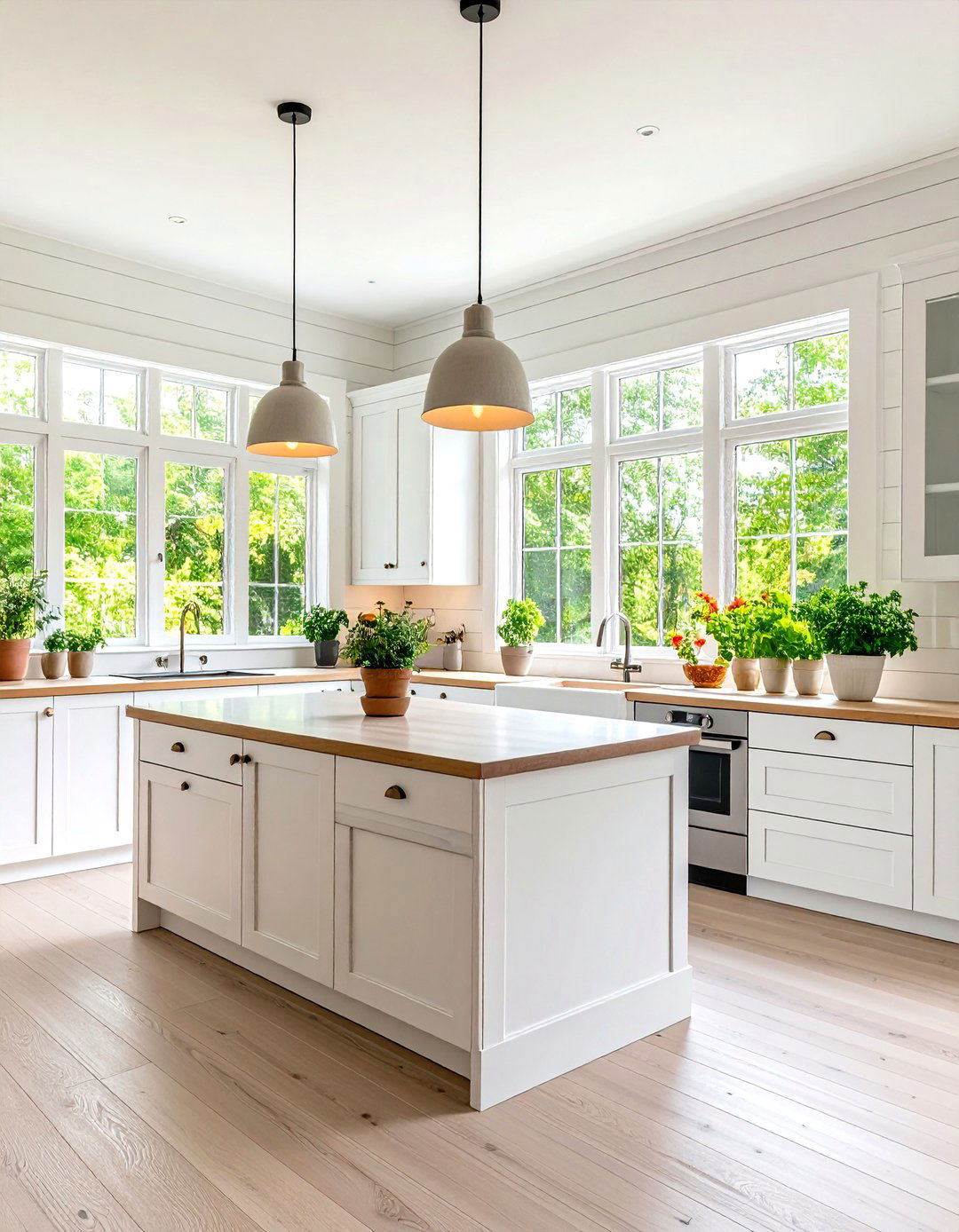
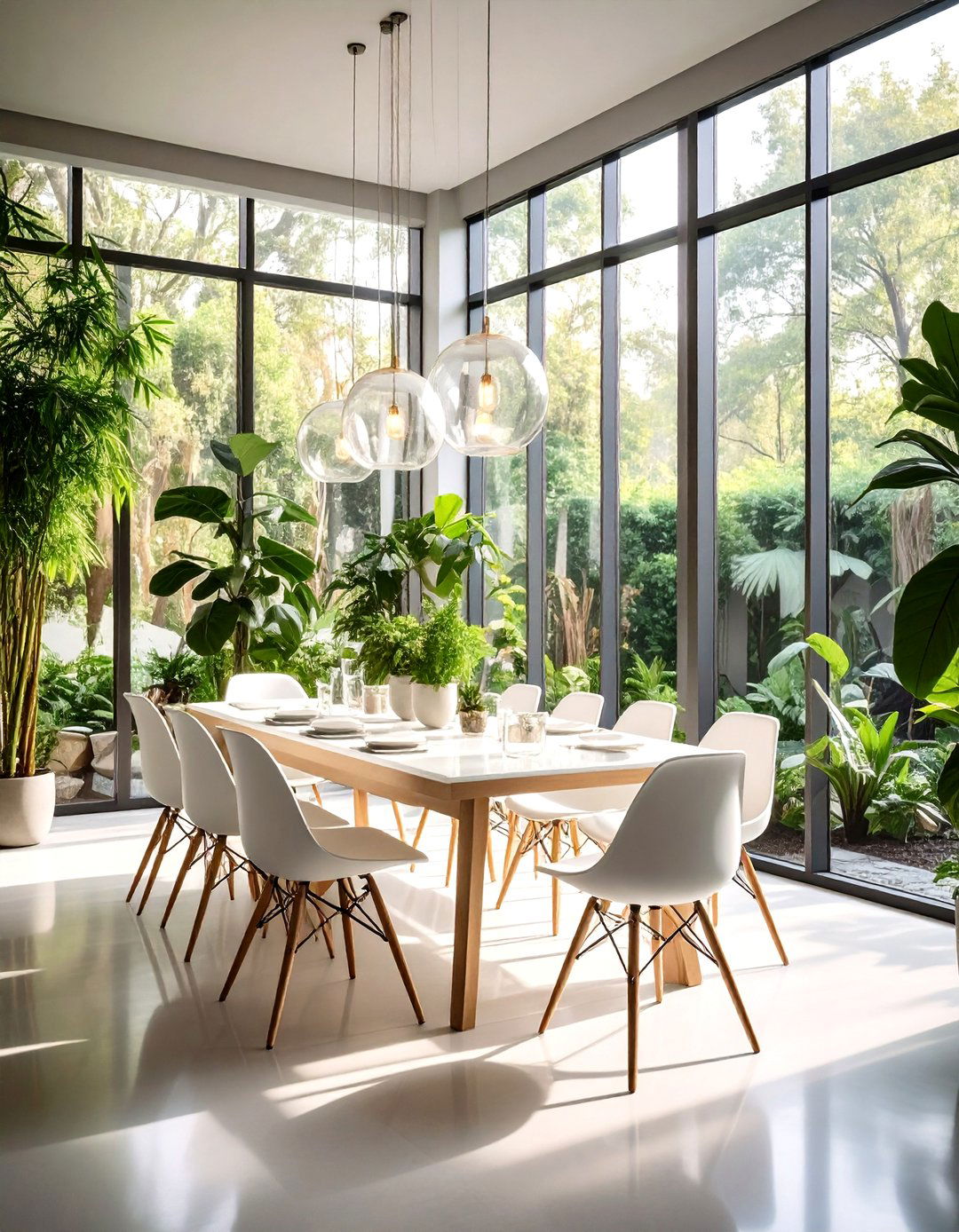
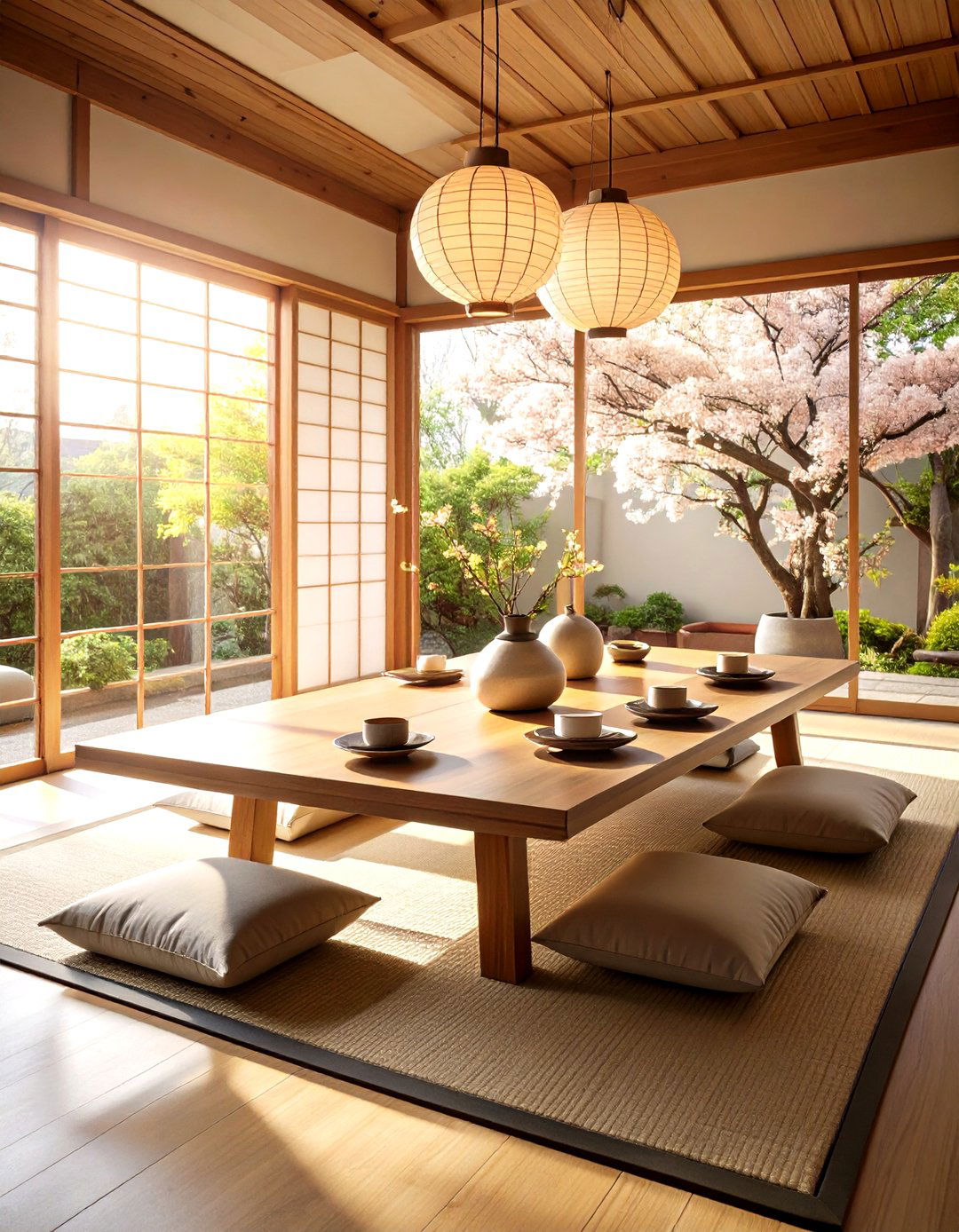

Leave a Reply